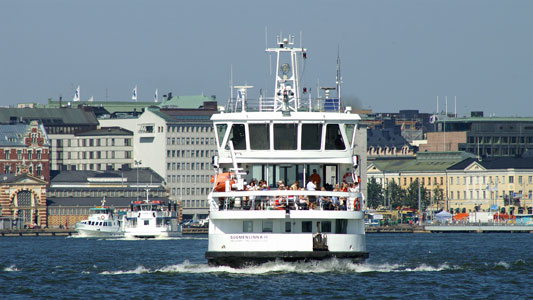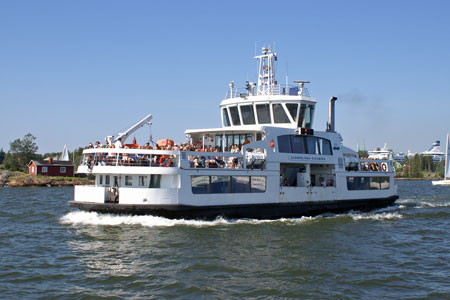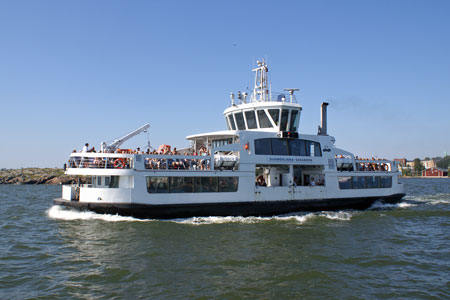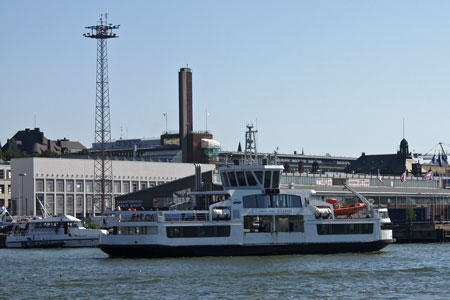|
|
|
| |
All images link to larger
copies which will open in a new window/tab
|
|
|
Public transport in Helsinki is considered to have begun in 1888, when the
first horse-drawn omnibuses started to run from Töölö to Kaivopuisto. Soon
after this, rails were installed to run horse trams. The horse trams ran for
ten years until electricity was introduced in 1900. On September 4th the
first electric tram started out on the route Töölö-Hietalahti. HKL had its
60-year anniversary in 2005. Helsinki City Transport (HKL) remains
responsible for running the trams and the metro as well as construction and
maintenance of track, stations and depots.
Public transport in Helsinki today consists of bus, tram, metro, train, and
ferry services. The system is run by Helsinki City Transport (HKL). Helsinki
(Helsingfors) is the only city in Finland to have access to trams or subway
trains. There used to be two other cities in Finland with trams: Turku (Åbo)
and Viipuri (Vyborg). However, Turku abandoned trams in 1972 and Viipuri (at
that time already part of the USSR) abandoned them in 1957.
Helsinki Regional Transport Authority (HSL) began operating on 1 January
2010 and is responsible for public transport planning, commissioning,
passenger information and ticket inspection. The new organization is
responsible for the planning and organization of public transport services
in its member municipalities, as well as for the preparation of the Helsinki
Region Transport System Plan.
The board of HKL decided on 2 December 2010 to order 40 new articulated
trams from the Finnish manufacturer Transtech Oy. Transtech is the direct
descendant of the state-owned Valmet, which built Helsinki's
Nr I and
Nr II trams. Two new trams are
to start test runs in 2013 and the production series deliveries are expected
to start in 2015. The order is worth €113 million and it includes an option
for a further 90 trams.
The new Transtech tram has a double-articulated, eight-axle design. It is
planned to be 27.3m (89ft 7in) long and to have 73 fixed seats, 14 foldable
seats and space for 75 standee passengers. The design has a 100% low floor
and conventional, turning bogies designed to run without problems on
Helsinki's challenging old-fashioned track network. (ref: Wikipedia/Kalle
Id)
Special thanks to Kalle Id for help with this page:
kships.blogspot.com
|
|
|
|
|
|
All images link to larger
copies which will open in a new window/tab
Number 50 is a tram of the ASEA "standard type" built in 1909. Identical
units were also used on the Turku and Viipuri tramways (in Helsinki the
units were nicknamed "pikkuruotsalainen", "little Swede"). A total of 76
units were delivered to Helsingin raitiotieosakeyhtiö (HRO, Helsinki Tramway
Company) in 1908-1919, making it the most numerous individual tram type to
be ever used in Helsinki. In 1945, when HRO became Helsinki City Transport,
the units were renumbered and number 50 became number 5. In 1957 #5 became a
shunter with the number H4, but it was withdrawn already 1959. The unit was
retained and officially became a museum tram in 1986. It later passed to the
Helsinki City Museum, and in 2009 the museum sold the tram to Stadin Ratikat
(Helsinki slang for "Helsinki Trams"), a private company operating museum
trams in Helsinki. Stadin Ratikat had the tram restored to working order and
original livery in Tallinn. It begun duties as a museum tram in 2013.
Refs: Finnish Tramway Society's website (raitio.org) and Stadin Ratikat's
website (stadinratikat.fi).
Vintage tram rides are offered
on 2-axle No.50 and trailer No.223
Photo: ©2013 Ian Boyle
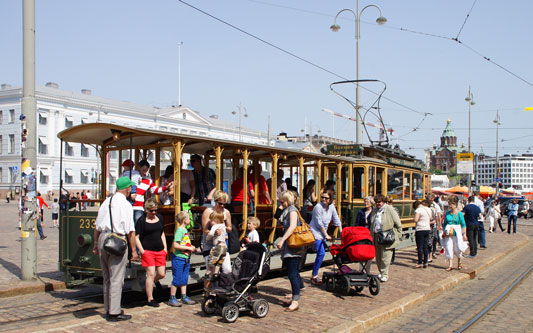
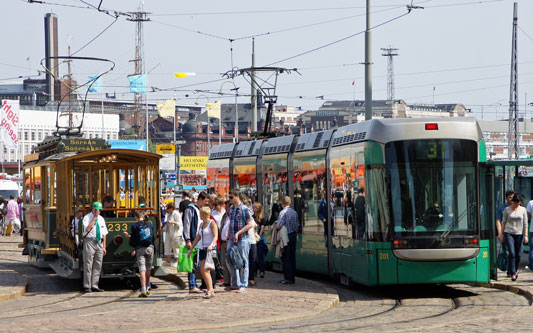
Unfortunately No.50 broke down
and had to return to the depot empty
Luckily I had travelled on it earlier
Photo: ©2013 Ian Boyle
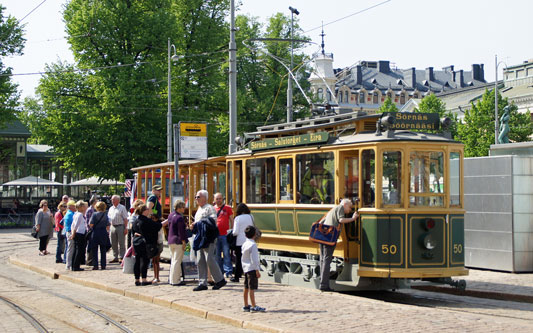
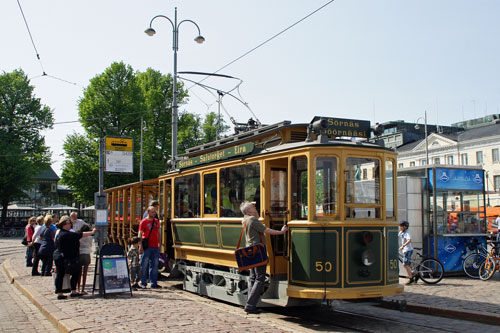
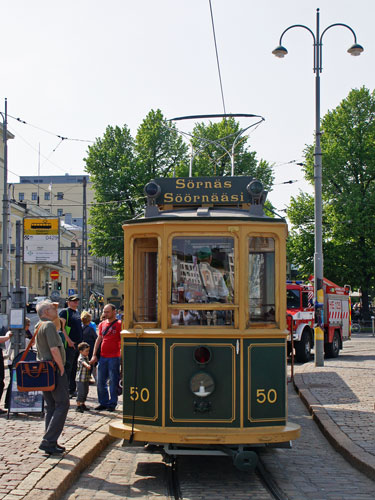
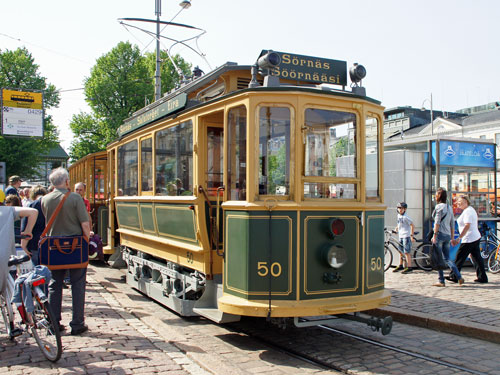
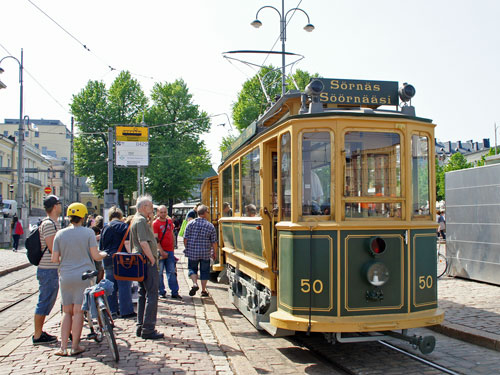
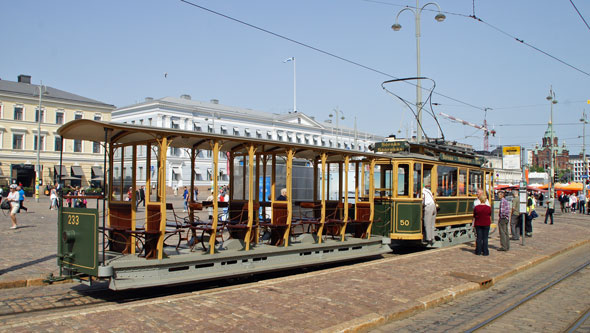
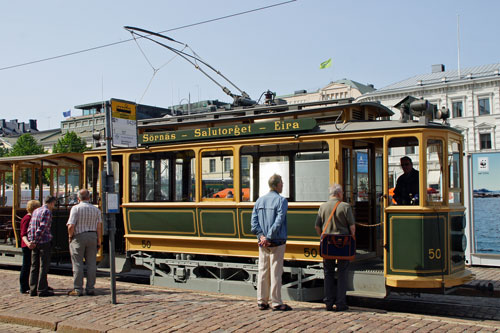
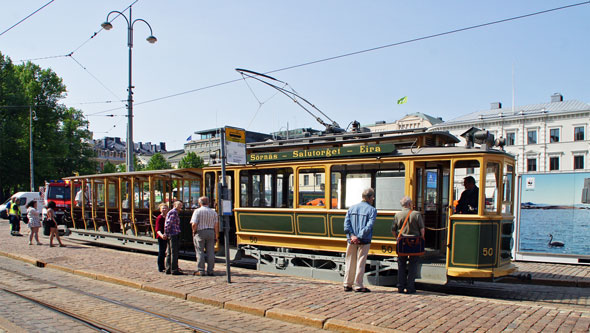

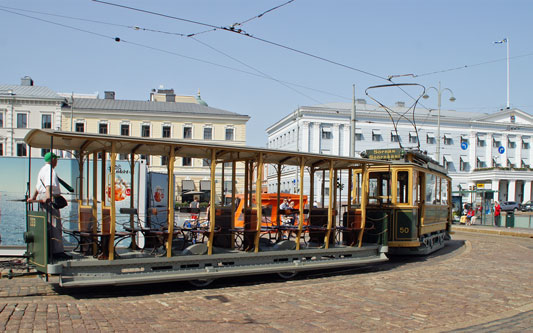
Number 233 is an open trailer built for summer traffic. Twelve units of this
type were built in 1919 by Hietalahden Telakka (Hietalahti Shipyard, the
same place that is known today as Arctech Helsinki Shipyard) for HRO. When
HRO became HKL in 1945, 233 was renumbered into 550. The open trailers
remained in use until the 1952 Summer Olympics, after which they were
withdrawn. The body of the 550 was sold in 1953 to a private owner to become
a gazebo. In 2007 it was purchased by Stadin Ratikat and taken to Tallinn
for renovation. The original wheels, axles etc had been lost, but
replacement parts were found in Tallinn from an old Gotha tram. The 550 was
restored to original appearance and was given back the original number 233,
reappearing in Helsinki in museum service in 2009. Initially the trailer was
paired with the HKL-owned museum unit 157, until the restoration works of
number 50 were completed in 2013.
Refs: Finnish Tramway Society's website (raitio.org) and Stadin Ratikat's
website (stadinratikat.fi).
Vintage tram rides are offered
on 2-axle No.50 and trailer No.223
Photo: ©2013 Ian Boyle
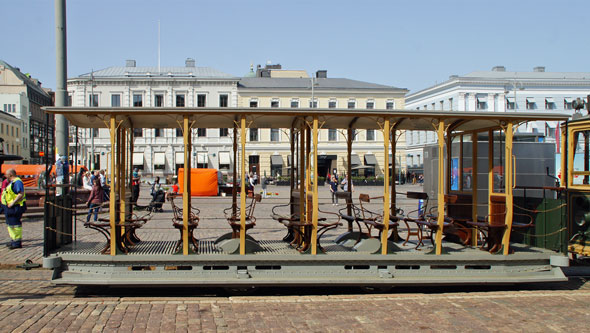
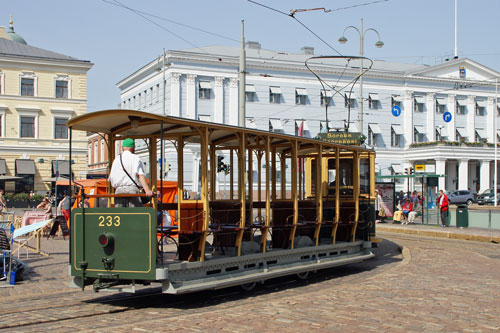
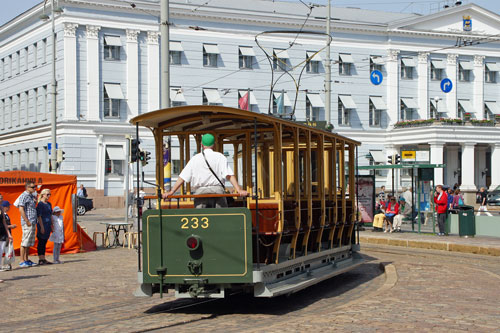
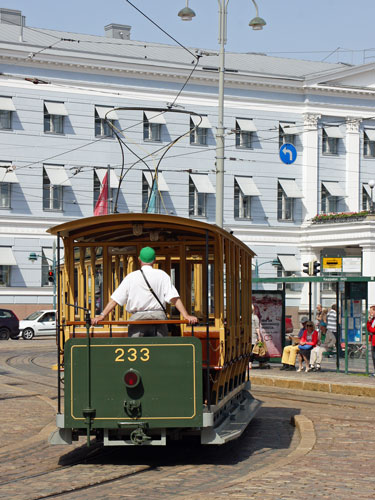
Valmet RM 1 Class Trams 331-375
The Valmet RM 1 class of trams was one of four
similar but not identical tram classes delivered to Helsinki during the
1950s (the other classes were Karia HM IV, Valmet RM 3 and Karia HM V - all
were loosely based on the "Mustang" trams built for various Swedish cities
during 1940s and 50s). The RM 1 trams were delivered during 1955-56 and
given the numbers 331-375. At the time it was thought these trams would be
used on planned light rail -type lines to various new suburbs, but over the
years there plans altered to become the Helsinki Metro. The RM 1 class
remained in regular service until the mid-80s, when it was replaced by the
new Nr.II class. Three RM 1 units survive at the time of writing (2012): 331
is in Helsinki City Museum's collections (stored in Tuusula and not open to
the public), 339 was restored to original appearance in 2004 by HKL and
Stadin Ratikat and is available for private charters through Stadin Ratikat
(www.stadinratikat.fi),
while 344 was converted to a shunter in 1984 and given a grey/yellow/black
livery.
The photographs of HKL 339 on line 2 are from Stadin Ratikat's 10th
anniversary, in honour of which line 2 (closed down in 2005) was briefly
reactivated with the route Kauppatori-Linjat that the line run on 1985-1992.
Information from raitio.org
and
stadinratikat.fi.
Tram 339
RM 1 tram 339
Photo: ©2009/2010 Kalle Id
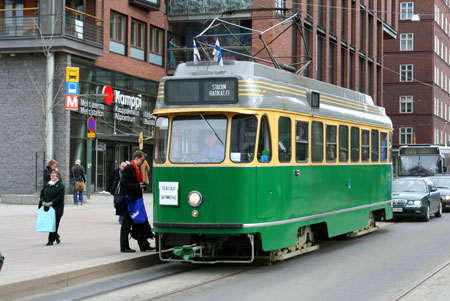
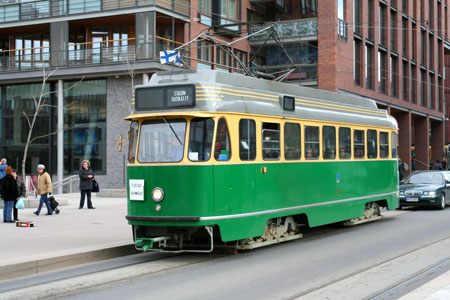
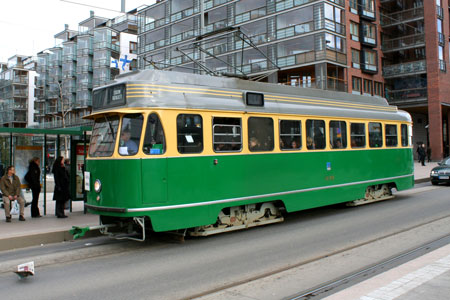
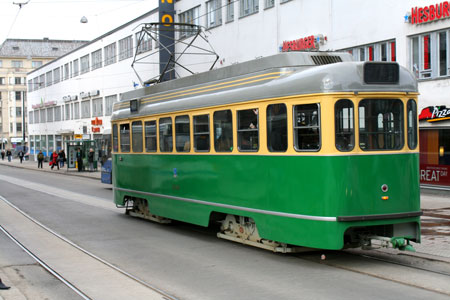
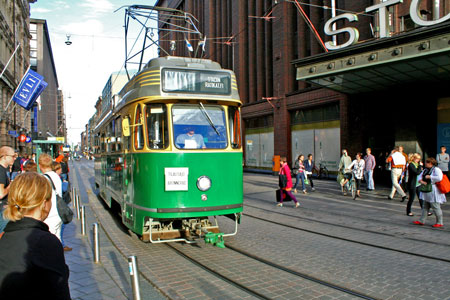
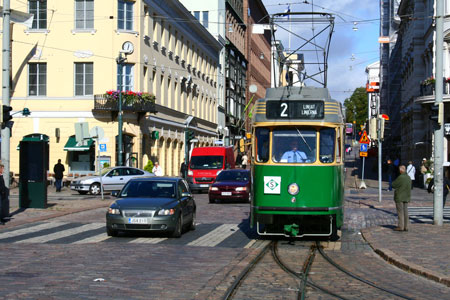
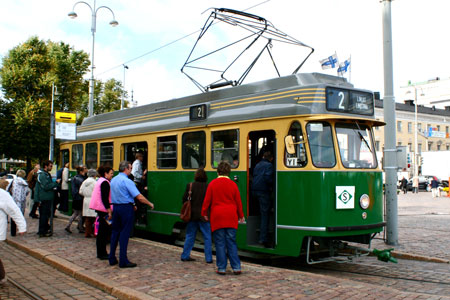
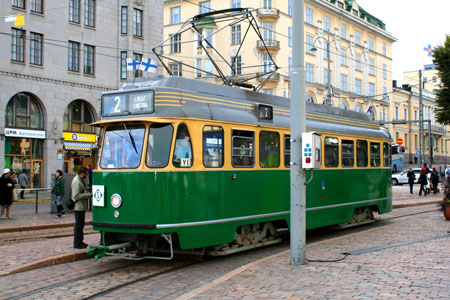
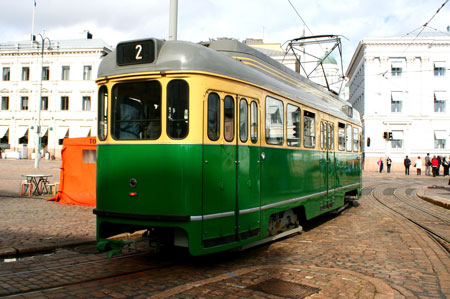
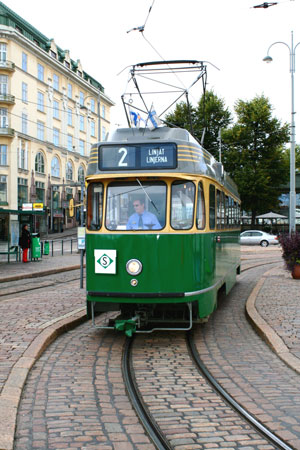
The The HM V tram class was the last four-axle tram
class to be delivered for service in Helsinki. They were also the last trams
ever built by the Finnish tram manufacturer Karia. The HM V class consisted
of 15 units, numbered 1-15, delivered in 1959. At the same time HKL had
ordered 15 near-identical RM 3-class trams from Valmet. The RM 3 units were
delivered some months before the HM V class, but confusingly were numbered
16-30. As built the HM V -class trams were equipped for multiple drive to
make them usable on planned suburban tram lines, but these lines were never
built and multiple drive never used. Originally the HM V class had
conductor's booths next to the rear door, but these were removed between
1978 and 1982 when HKL moved to one-man operations in trams. The first HM V
units were withdrawn in 1993, but the bulk of the series survived in regular
service until the delivery of the Variotrams. After this they were used as
reserve units until 2010, although very rarely used in normal traffic.
Number 14 was also used as a moving advertisement in 200-2008 (on charters,
never in regular traffic).
In 1995 HM V number 15 was converted into a pub tram in collaboration with
the Sinebrychoff brewery. The tram's interiors were rebuilt, the central
door removed, it was renumbered 175 in honour of Sinebrychoff's 175th
anniversary, repainted in a red livery advertising Sinebrichoff's Koff beer
and nicknamed Spårakoff (from Helsinki slang spåra = tram + Koff). At the
time of writing, in addition to number 175 (ex-15), numbers 9, 11 and 12
survive. 9 and 12 were restored to the original appearance in 2004-2007 and
are used as charter trams, alongside a matching HP II -class trailer number
505 from 1958. Number 11 will be used as a test vehicle for the technology
to be used in the upcoming Transtech trams (it was already used in a similar
capacity for the Variotrams). After the tests it will be scrapped. Number
175 is the only remaining unit seen in regular service, but naturally only
on the special pub line. (ref:
raitio.org).
Tram 14
HM V tram 14
Photo: © Kalle Id 8th October 2008
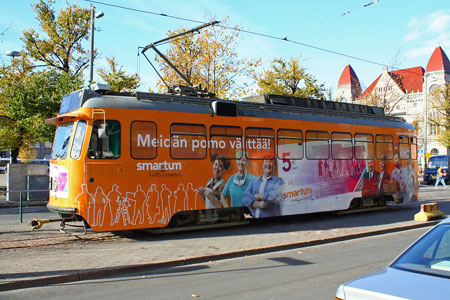
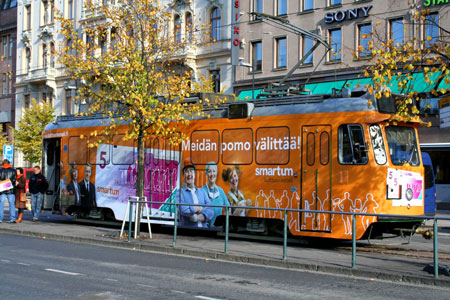
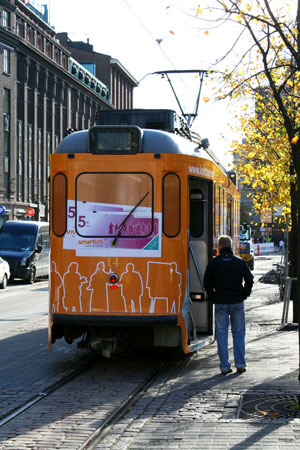
Tram 175 (ex-15)
HM V tram 175 - 'Pub Tram'
Photo: © Kalle Id 2010
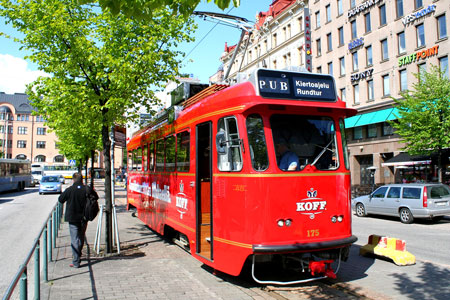
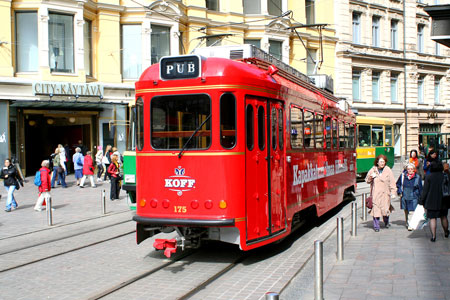
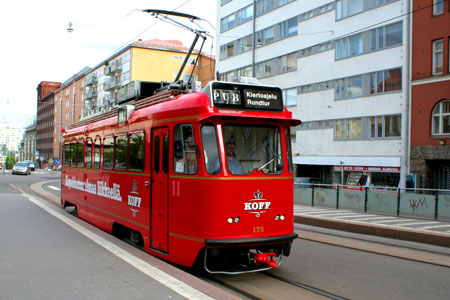
HM V tram 175 - 'Pub Tram'
Photo: © Ian Boyle 9th August 2007
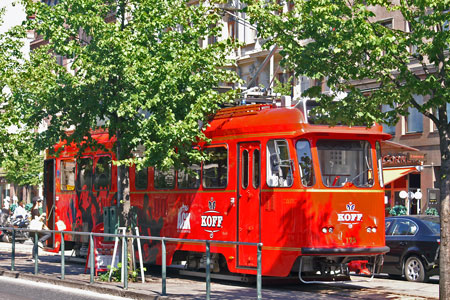
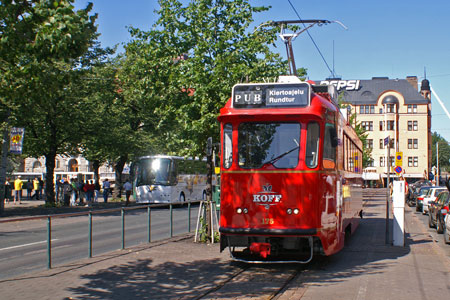
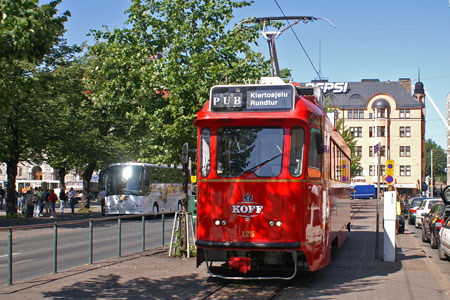
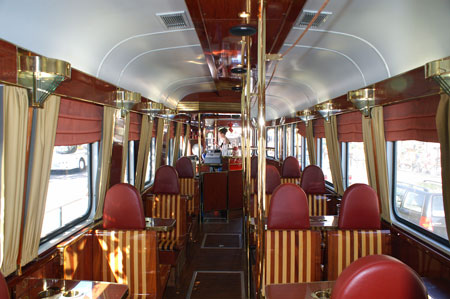
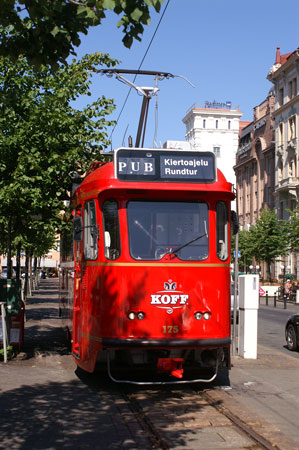
The Valmet Nr I class was the first type of
articulated tram operated by HKL. The design of the Nr I type trams was
based on the German Düwag GT6 type trams built from1956. The Nr I trams were
delivered by Valmet between 1973 and 1975, with the first seven trams
delivered in 1973, a further 18 delivered in 1974 and the final 15 in 1975.
The first tram of this class entered revenue-earning service on 16th
December 1973 on line 10. They were delivered in a light grey & orange
livery, but later repainted in a more traditional green & cream between
1986-1995. The HKL tram numbering system had been reset in
1959, with the numbering of new trams delivered that year beginning from 1.
Valmet Nr I trams are numbered 31 to 70. 10 trams of class Nr I will receive
new low-floor centre sections to become MLNRV class, as will all of the Nr
II class. (ref: Wikipedia/Kalle Id)
Tram 31
The original Valmet Nr I tram
No.31 on routes 1A and 1
Photo: © Ian Boyle, 9th August 2007
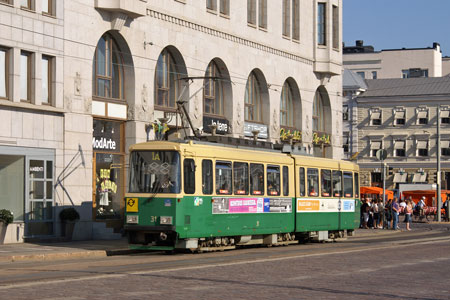
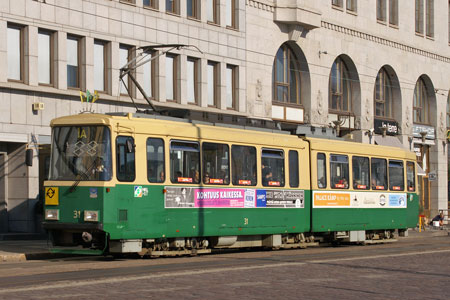
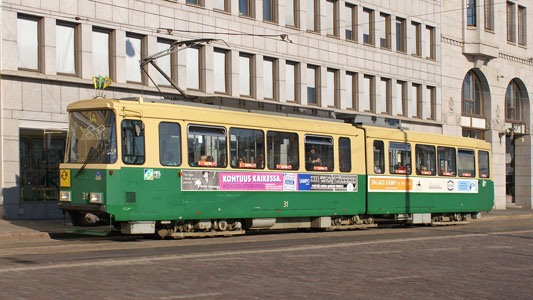
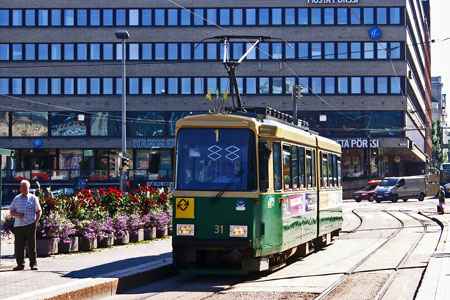
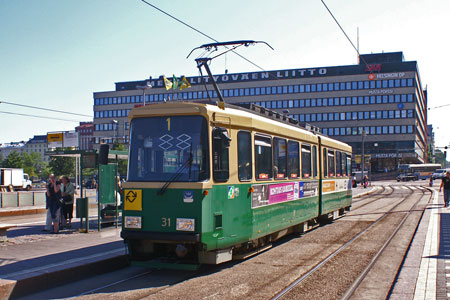
Tram 39
Valmet Nr I tram No.39 on route
1
Photo: © Ian Boyle, 9th August 2007
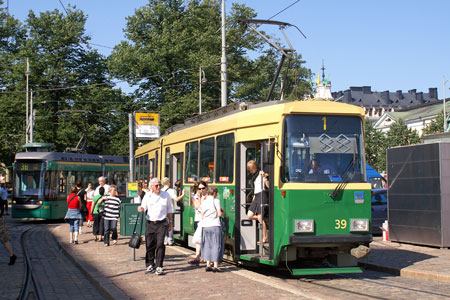
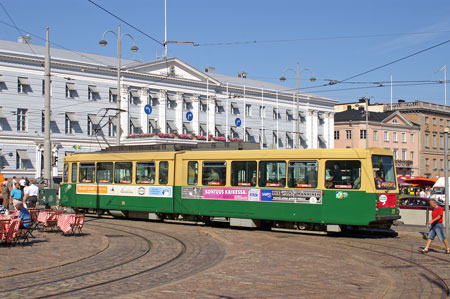
Tram 40
Valmet Nr I tram No.40 on route
7A
Photo: © Ian Boyle, 9th August 2007
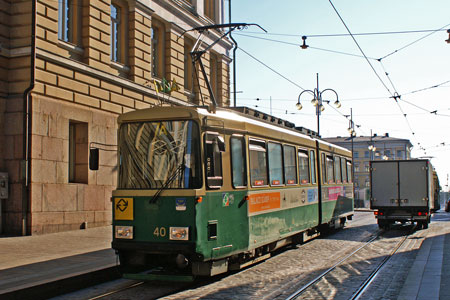
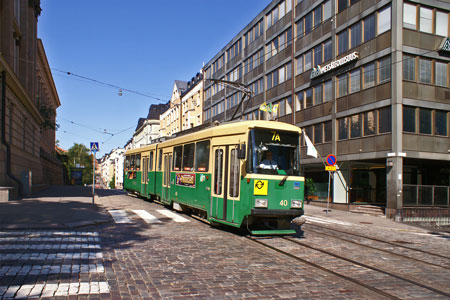
Tram 44
Valmet Nr I tram No.44 on route
1A
Photo: © Ian Boyle, 9th August 2007
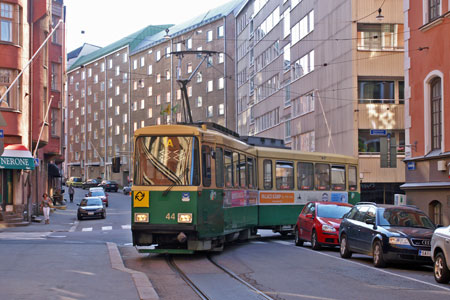
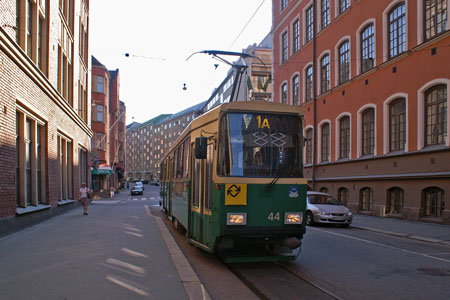
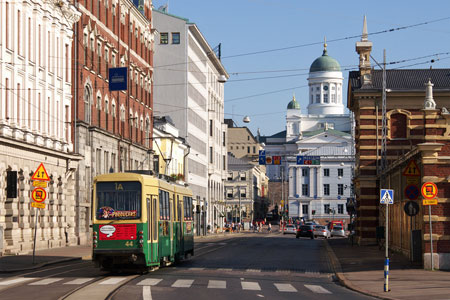
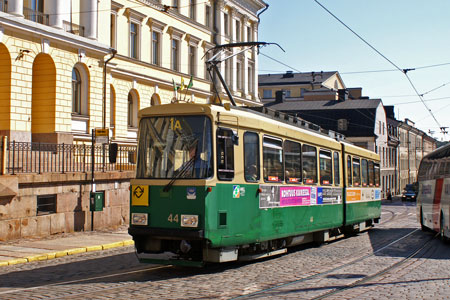
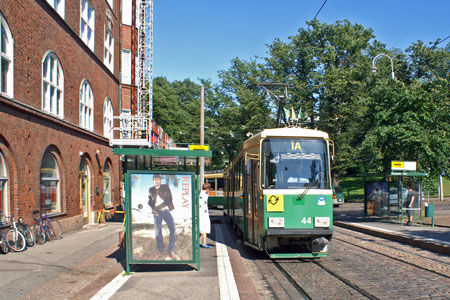
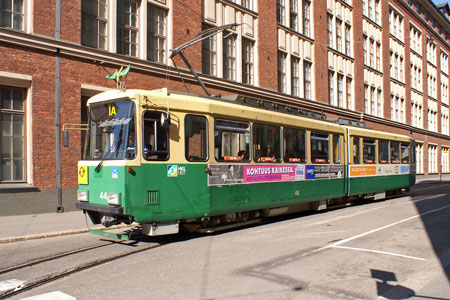
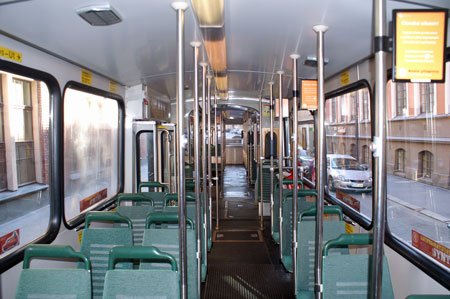
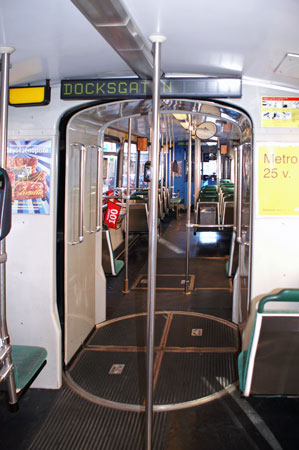
Tram 45
Valmet Nr I tram No.45 on route
7B
Photo: © Ian Boyle, 9th August 2007
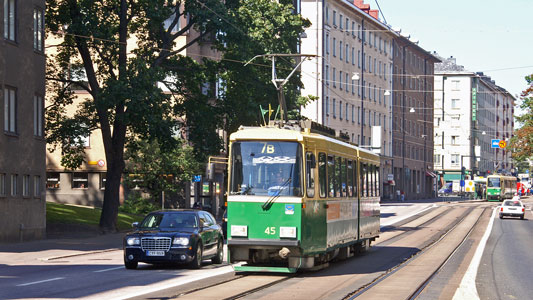
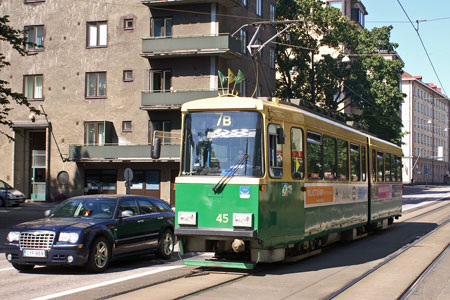
Tram 47
Valmet Nr I tram No.47 on route
1
Photo: © Ian Boyle, 9th August 2007
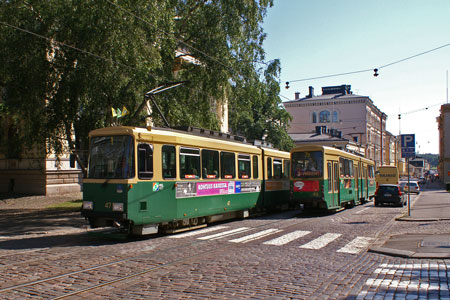
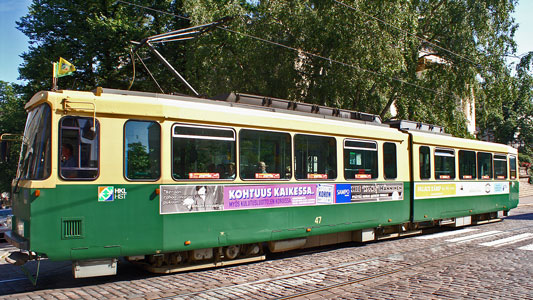
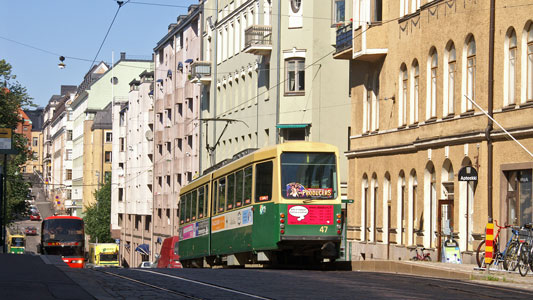
Tram 51
Valmet Nr I tram No.51 on route
4B
Photo: © Ian Boyle, 9th August 2007
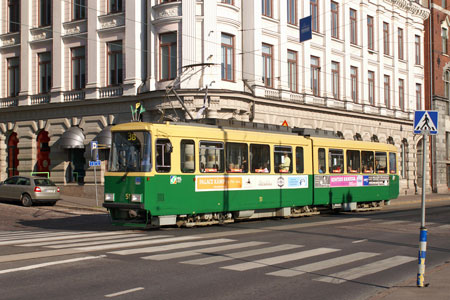
Tram 52
Valmet Nr I tram No.52 on route
3B
Photo: © Ian Boyle, 9th August 2007
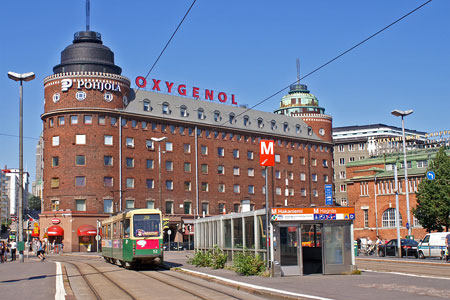
Tram 58
Valmet Nr I tram No.58 on route
1B
Photo: © Ian Boyle, 9th August 2007
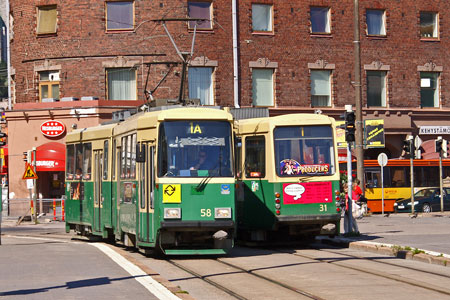
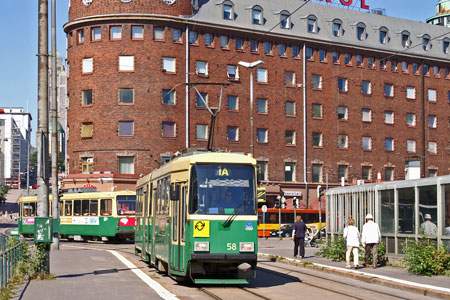
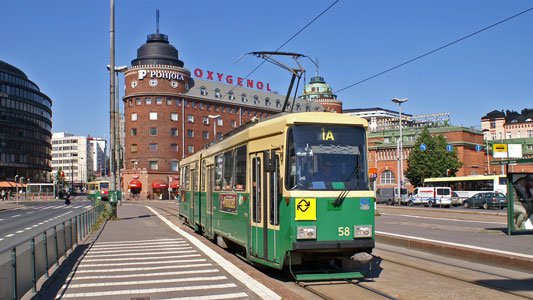
Tram 61
Valmet Nr I tram No.61
Photo: © Ian Boyle, 9th August 2007
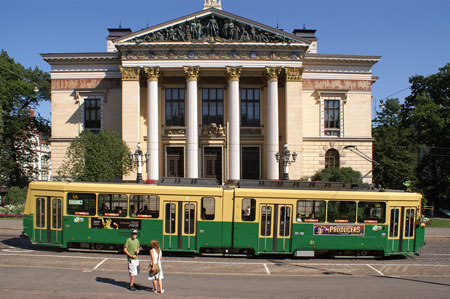
Tram 63
Valmet Nr I tram No.63 on route
7B
Photo: © Ian Boyle, 9th August 2007
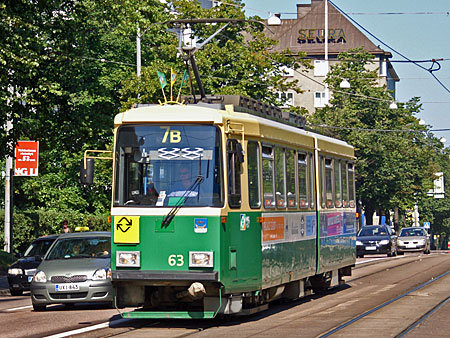
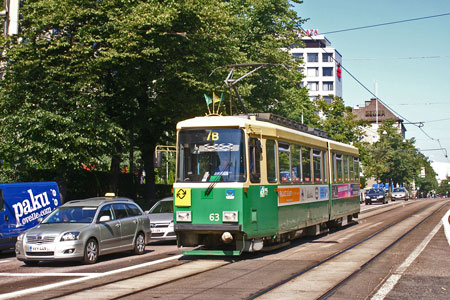
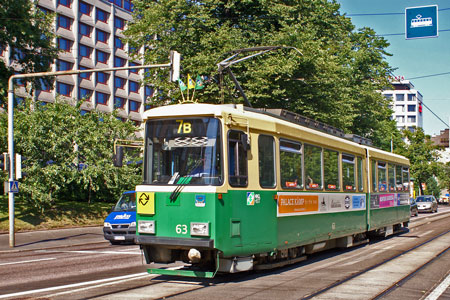
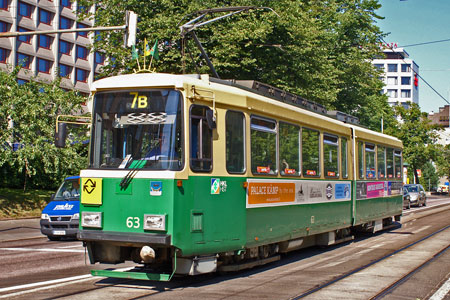
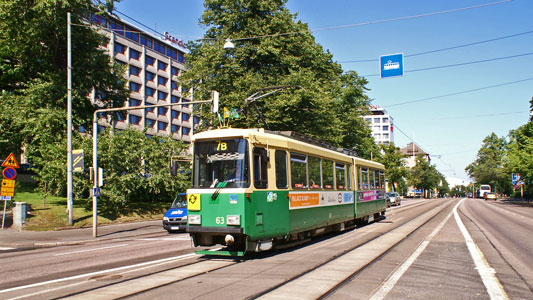
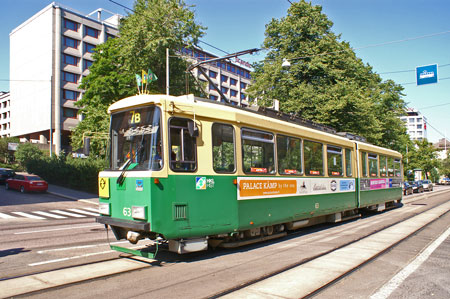
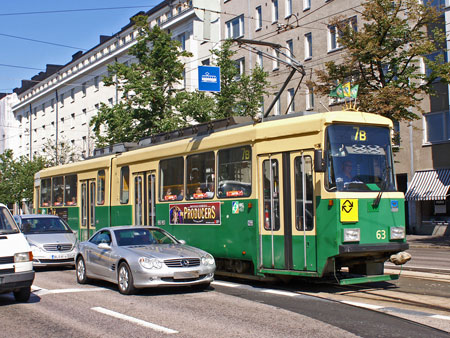
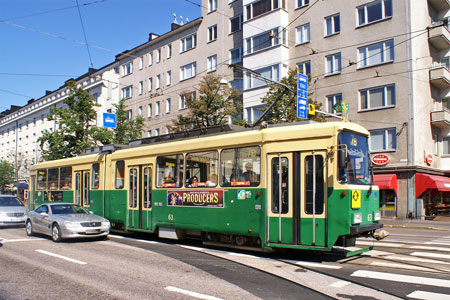
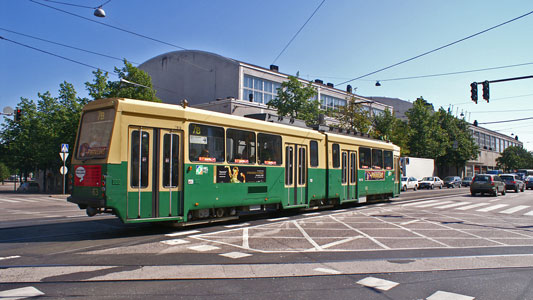
Tram 70
Final Valmet Nr I tram No.70 on
route 7A
Photo: © Ian Boyle, 9th August 2007
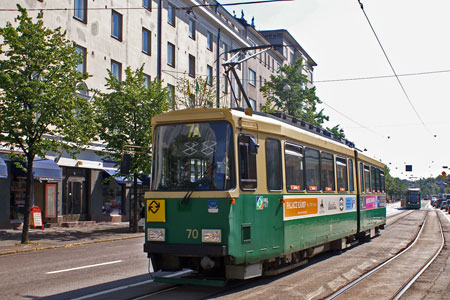
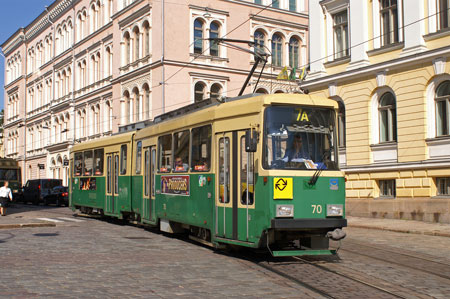
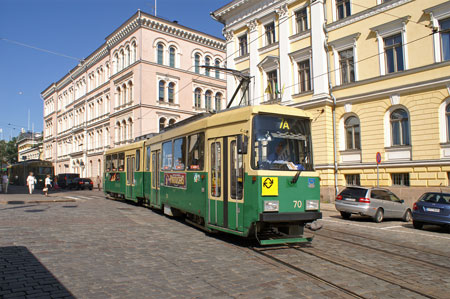
Valmet Nr II Trams 71-112
The Nr II class was a further development of the Nr I
class built by Valmet for the HKL between 1973 and 1975 (the Nr I was in
turn based on the popular Düwag-built GT6 class). The Nr I and Nr II classes
are virtually identical in their exterior and interior designs. The first
three Nr II class trams were delivered to HKL in 1983, followed by an
additional 11 in both 1984 and 1985, a further ten in 1986 and the final
seven in 1987. The first tram in the class entered service for HKL in July
1983. They were delivered in a light grey & orange livery, but then
repainted in a more traditional green & cream between 1986-1995. Between 1996 and 2005 all trams in this class were modernised and
re-designated as Nr II+.
On July 21, 2003, one of the Nr II class trams
derailed at high speed in the junction between Mannerheimintie and
Aleksanterinkatu in central Helsinki. Investigation into the causes of the
accident revealed that the driver of the tram had lost consciousness shortly
before the collision due to the extreme heat in the cockpit of the tram. As
a result of the accident the HKL redesigned the windshield of the Nr II
class trams, adding a large visor that contains an air-conditioning unit as
well as shields the driver from direct sunlight. Trams 72, 95 and 109 were
refitted with modified windshields in 2005. Between 2004 and 2007 all trams
in the class were built with new line displays on the front and side of the
tram, displaying both the number and destination on the line. In 2006 tram
number 80 was rebuilt with a new 6.5 m (21 ft 4 in) low-floor midsection,
built by Verkehrs Industrie. To cope with the added weight of the
midsection, the output of the traction motors was increased by approximately
20%. Experiences with the prototype lengthened tram were positive, and the
rest of the Nr II class will be similarly rebuilt from late 2008 onwards.
The units rebuilt with low-floor midsection are also known with the class
designation MLNRV and they are expected to remain in service until 2025. 10
trams of class Nr I will also receive new low-floor centre sections to
become MLNRV class. (ref: Wikipedia/Kalle Id)
Tram 72
Valmet Nr II tram No.72 on route
6 - one of three trams (72, 95 & 109) with a revised windscreen design
Photo: © Ian Boyle, 9th August 2007
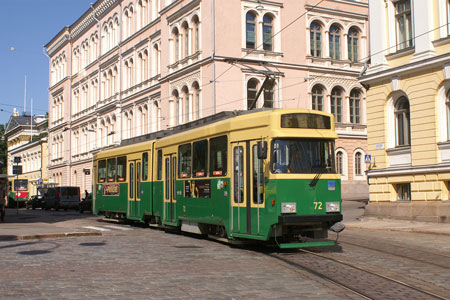
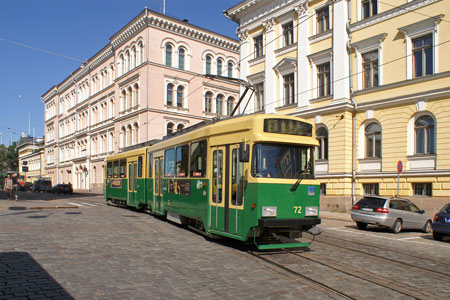
Tram 84
Valmet Nr II tram No.84 on route
4
Photo: © Ian Boyle, 9th August 2007
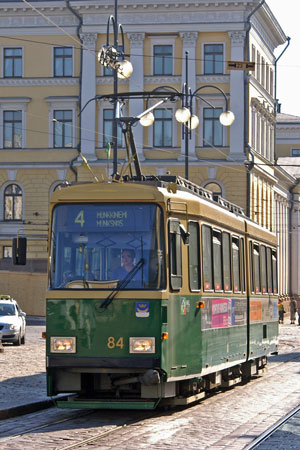
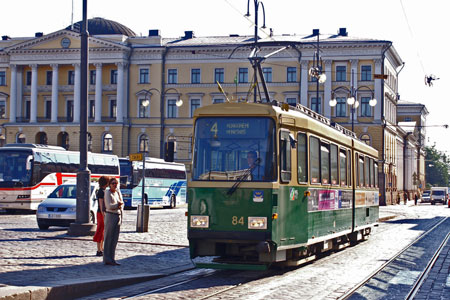
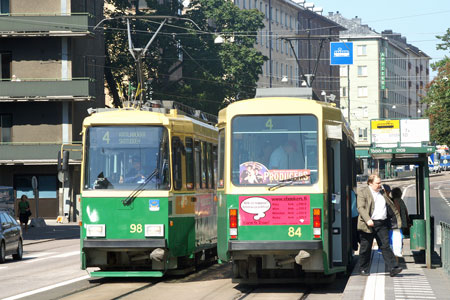
Tram 90
Valmet Nr II tram No.90 on route
10
Photo: © Ian Boyle, 9th August 2007
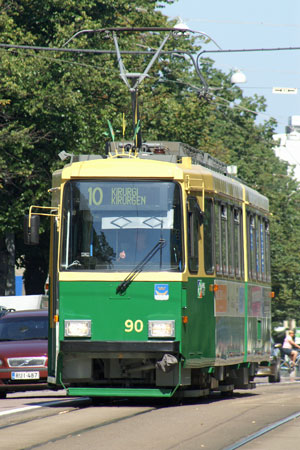
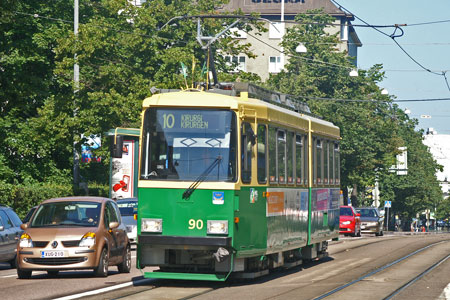
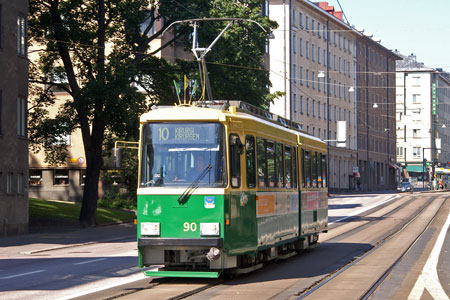
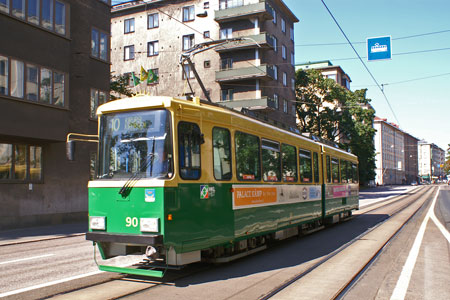
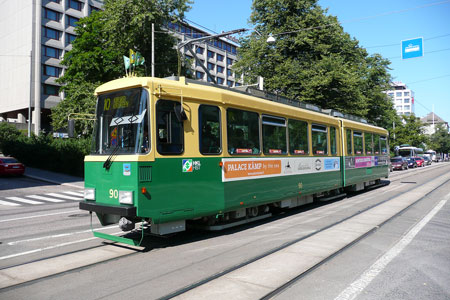
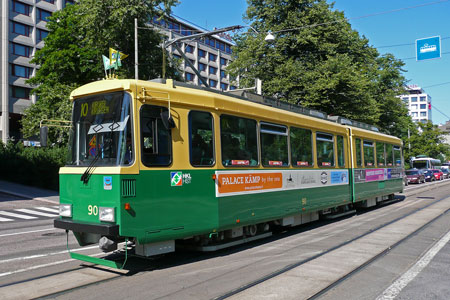
Tram 98
Valmet Nr II tram Nos.98 & 84 on
route 4
Photo: © Ian Boyle, 9th August 2007

Tram 101
Valmet Nr II tram No.101 on
route 4
Photo: © Ian Boyle, 9th August 2007
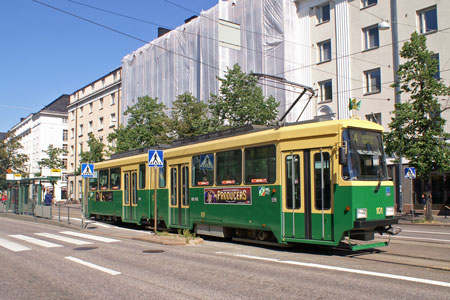
Tram 104
Valmet Nr II tram No.104 on
route 4
Photo: © Ian Boyle, 9th August 2007
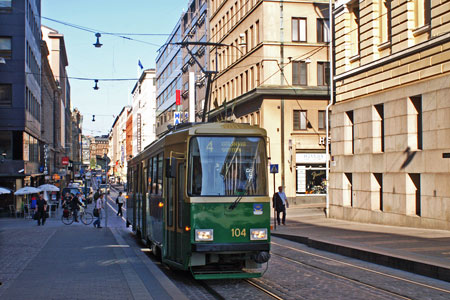
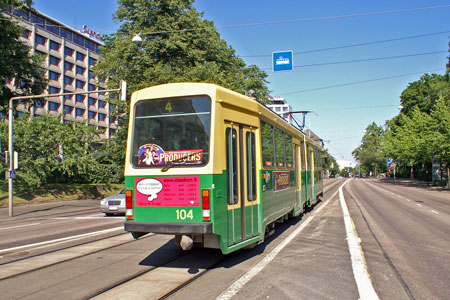
Tram 105
Valmet Nr II tram No.105 on
route 6
Photo: © Ian Boyle, 9th August 2007
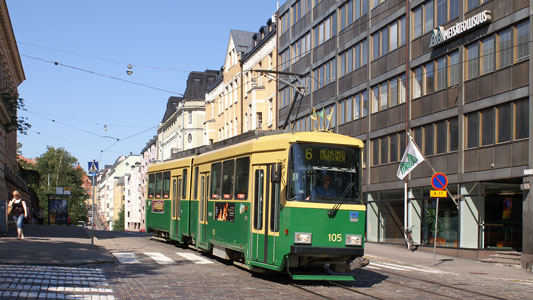
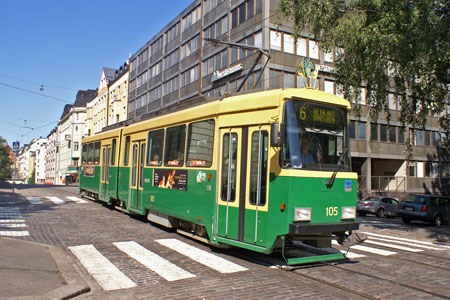
Tram 110
Valmet Nr II tram No.110 on
route 6
Photo: © Ian Boyle, 9th August 2007
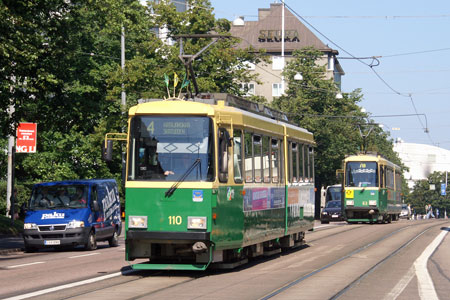
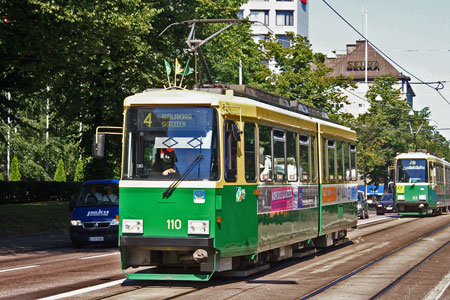
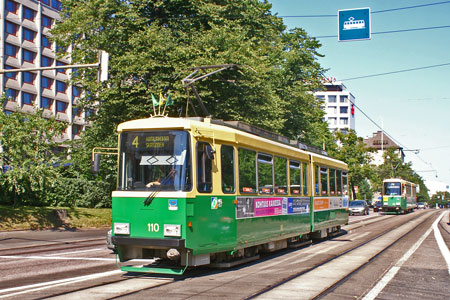
Valmet/Verkehrs Industrie MLNRV Trams
In 2006, Valmet Nr II tram
number 80 was rebuilt with a new 6.5 m (21 ft 4 in) low-floor midsection,
built by Verkehrs Industrie. To cope with the added weight of the
midsection, the output of the traction motors was increased by approximately
20%. Experiences with the prototype lengthened tram were positive, and the
rest of the Nr II class will be similarly rebuilt from late 2008 onwards.
The units rebuilt with low-floor midsection are also known with the class
designation MLNRV and they are expected to remain in service until 2025. 10
trams of class Nr I will also receive new low-floor centre sections to
become MLNRV class. (ref: Wikipedia/Kalle Id)
Tram 77
Valmet/Verkehrs Industrie tram No.77
on route 7B
Photo: © Kalle Id 4th September 2011
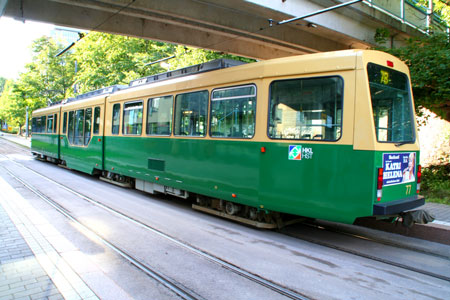
Tram 94
Valmet/Verkehrs Industrie tram No.94
on route 7A
Photo: © Kalle Id 13th May 2011
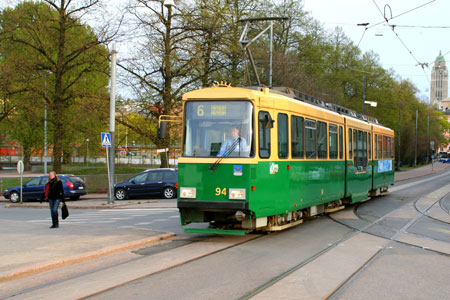
Tram 102
Valmet/Verkehrs Industrie tram No.102
on route 4
Photo: © Kalle Id 22nd June 2010
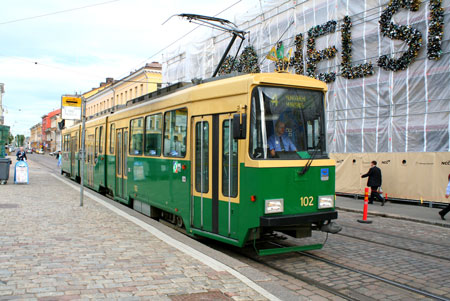
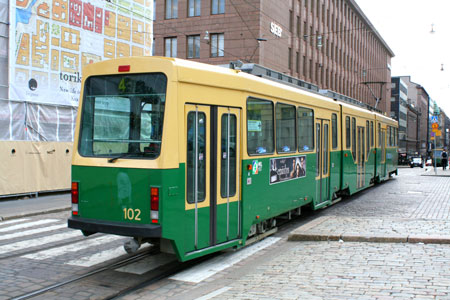
Tram 107
Valmet/Verkehrs Industrie tram No.107
on route 4
Photo: © Kalle Id 2010/2011
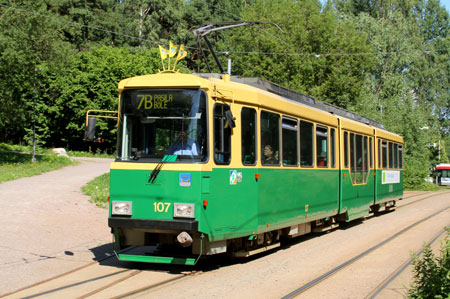
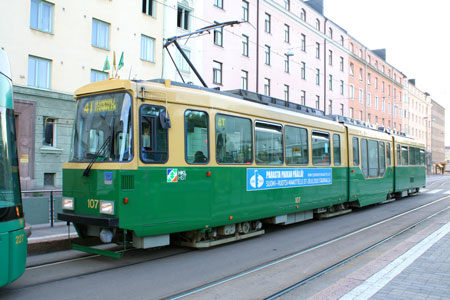
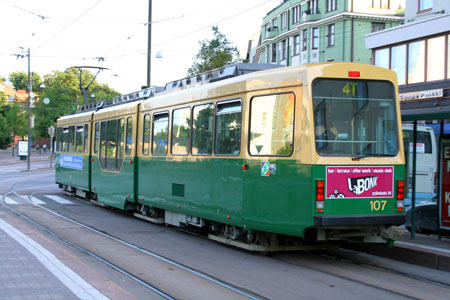
Tram 109
Valmet/Verkehrs Industrie tram No.109
on route 9 (revised windscreen)
Photo: © Kalle Id 12th October 2010
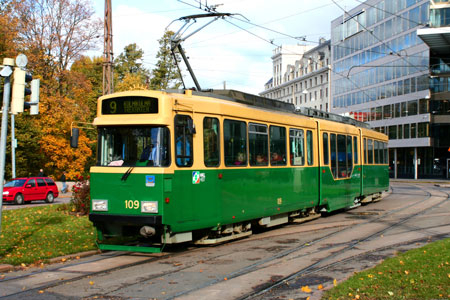
There is just one Düwag GT8-type tram in use in
Helsinki, HKL 150. The tram was originally built for Verkehrsbetriebe
Ludwigshafen am Rhein GmbH (VBL) in 1967 as the GT6-type tram number 150. In
1970 a new midsection was fitted and hence the tram became a GT8-type unit.
It was withdrawn from use in Ludwigshafen in 2003. In 2004 HKL acquired the
tram as a test vehicle for the MLNRV project - if a double-articulated
GT8-class tram could cope with Helsinki's track network, so could the
envisioned double-articulated MLNRV units. The tram retained it's original
number, becoming HKL 150. After tests during 2004 HKL 150 was used
occasionally on lines 1 and 1A until 2005. In 2006 it was converted into a
charter tram with special interior fittings. (ref: raitio.org/Kalle Id)
Tram 150
Ex-Ludwigshafen am Rhein
Düwag GT8 150
Photos: ©2009 Kalle Id
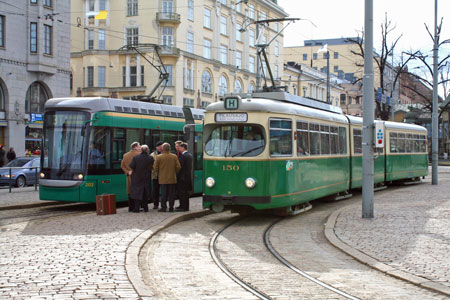
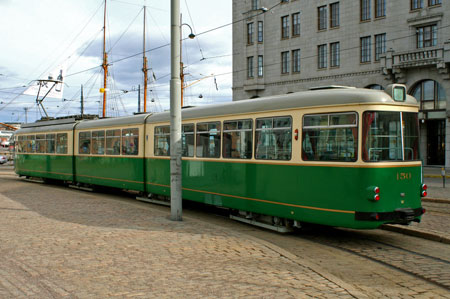
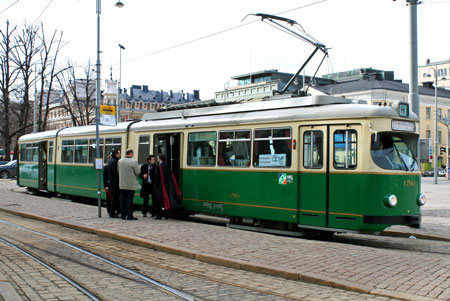
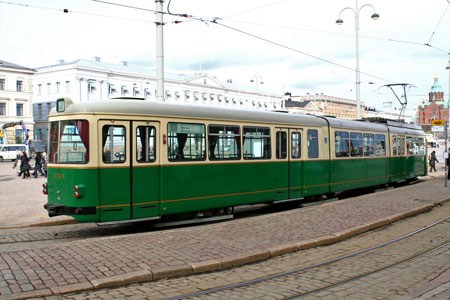
Four Düwag GT6-type trams were acquired by HKL in
2005 from Mannheimer Versorgungs- und Verkehrs-Aktiengesellschaft (MVV) in
Mannheim, Germany as a solution to the chronic tram shortage caused by
persistent reliability problems with the Variotrams. In Mannheim the
1970-built trams carried the numbers 453, 456, 457 and 455, becoming numbers
151, 152, 153 and 154 in Helsinki, respectively. A further ex-Mannheim tram
(MVV 451) was bought and used as a source of spare parts. All GT6 trams were
painted in advertisement liveries, with the liveries usually changing every
six or twelve months. Due to their city of origins the class has been
nicknamed "Manne", which is also a semi-pejorative term for a romani (gypsy)
in Finnish. The GT6 units are slated for withdrawal once the new
Transtech-built trams are delivered from 2015 onwards.
(ref: raitio.org/Kalle Id)
Tram 151
Ex-Mannheim Düwag GT6 151
Photos: ©2010 Kalle Id
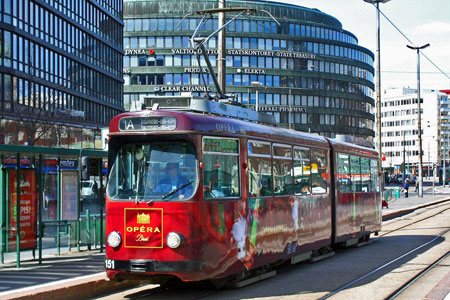
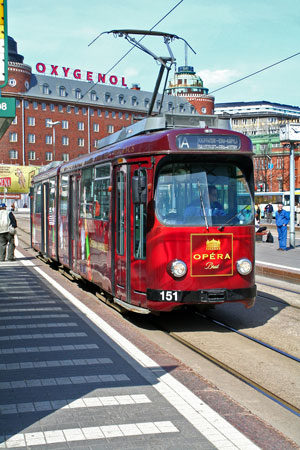
Tram 152
Ex-Mannheim Düwag GT6 152
Photos: ©2010 Kalle Id
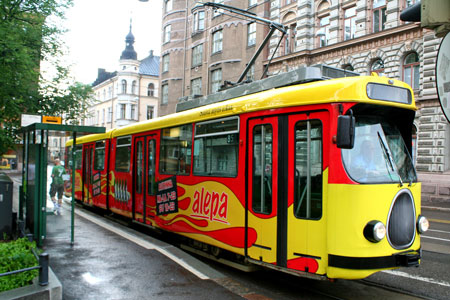
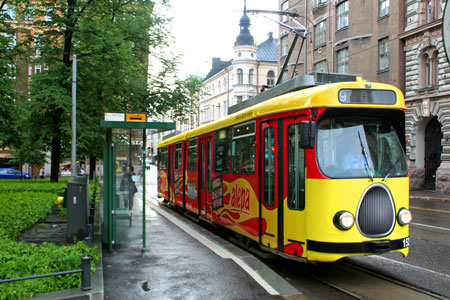
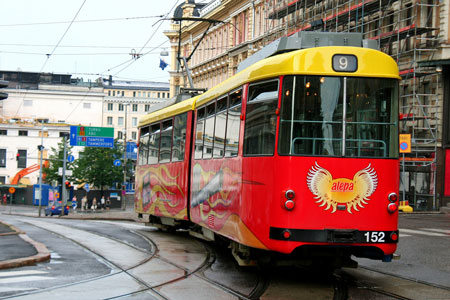
Tram 154
Ex-Mannheim Düwag GT6 154
Photos: ©2011 Kalle Id
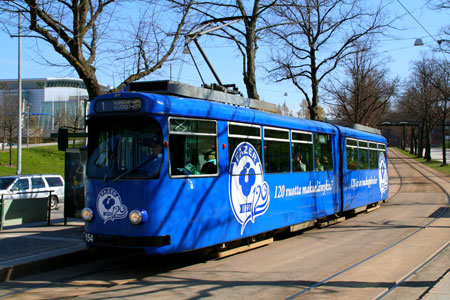
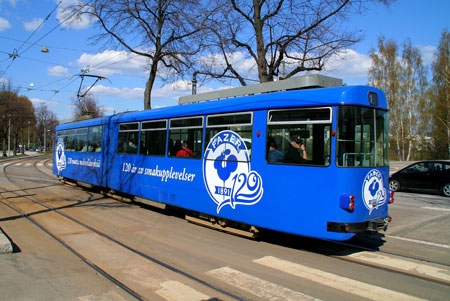
Following the relative success of the second-hand
Düwag GT6 trams and due to the continued problems with the Variotrams, in
2007-2008 HKL acquired a further six second-hand trams from Mannheim. These
were of the GT8N-type, double-articulated with a low-floor midsection.
Originally these units had been built in 1962/1964, with the midsections
fitted in 1991-1992. They were withdrawn from service in Mannheim in
2005-2006. In Helsinki the trams were numbered 161-166. Numbers 161, 163 and
165 were painted in the traditional yellow/green livery, 162 and 164 in
advertisement liveries and 1966 in a special livery as a culture tram (see
below). The units entered service in Helsinki during 2008-2009. For whatever
reason the GT8N series has not been as popular as the GT6 series - of the
GT8N's, only number 162, 164 and 166 are regularly seen in service. 161 and
163 have been seen occasionally, but 165 has never been in passenger service
according to the Finnish Tramway Society's website raitio.org.
HKL 166 was converted into a special culture tram. It was given a special
silvery exterior livery (earning it the nickname Silakka, "The Herring")
with a sculpture, Maskotti ("The Mascot") above the line number display. It
also has special interior fittings allowing for art and video displays as
well as a PA system allowing for music performances, small-scale theatre
production, dance performances and even stand-up comedy. The culture tram
entered regular service in 2010. It is used on regular traffic on weekdays,
usually on line 7, with live performances usually taking place between 5 and
6 PM. (ref: raitio.org/Kalle Id)
Tram 162
Ex-Mannheim Düwag GT8N 162
Photos: ©2011 Kalle Id
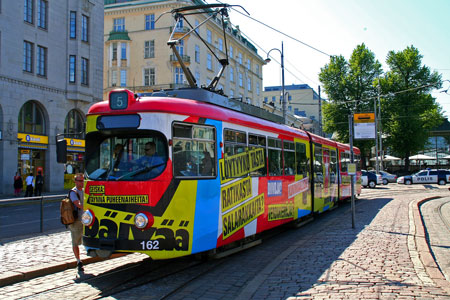
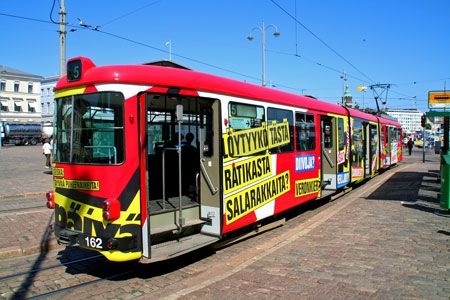
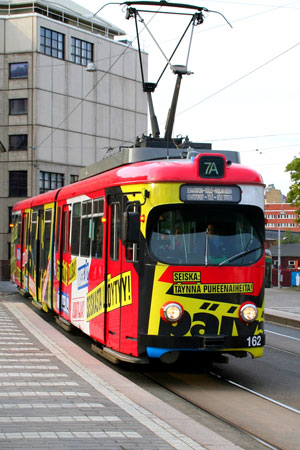
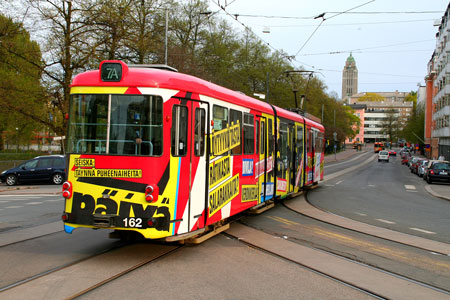
Tram 164
Ex-Mannheim Düwag GT8N 164
Photos: ©2010 Kalle Id
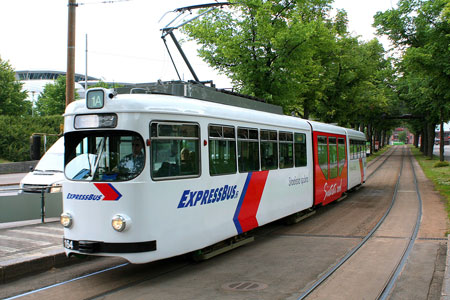 Ex-Mannheim Düwag GT8N 164
Ex-Mannheim Düwag GT8N 164
Photos: ©2011 Kalle Id
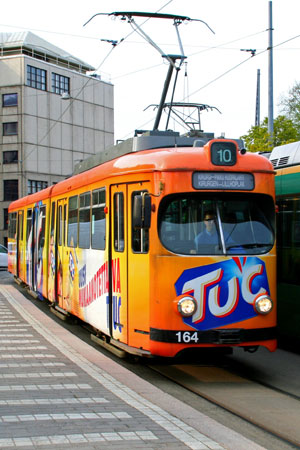
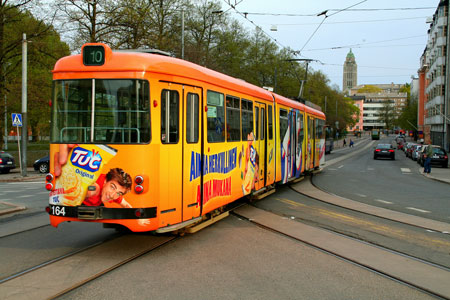
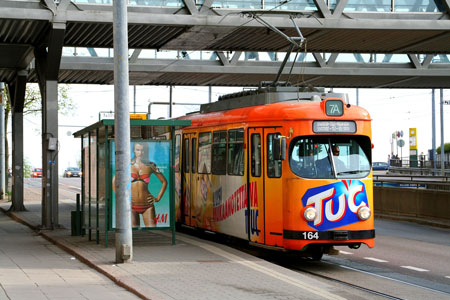
Tram 166
Ex-Mannheim Düwag GT8N 166
Photos: ©2010 Kalle Id
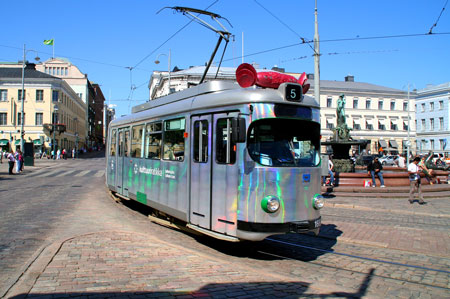
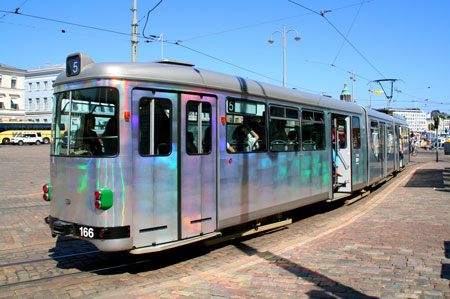
Variotram/Variobahn Trams 201-240
40 Variotrams were delivered to Helsinki between
1998-2001. The Variotram (German Variobahn) is a German-designed articulated
low-floor tram model. Since its introduction in 1993, the Variotram has been
manufactured variously by ABB, Adtranz, Bombardier Transportation, and since
2001 by Stadler Rail. As of 2009, 254 trams have been ordered, with an
additional 110 on option. A unit costs about €2.5 million. Operators other
than Helsinki include the Bergen Light Rail, Chemnitzer Verkehrs AG,
Verkehrsverbund Rhein-Ruhr, the Rhine Neckar Area Tramway and the Metro
Light Rail of Sydney. (ref: Wikipedia/Kalle Id)
Tram 202
Variotram No.202 on route 4
Photo: © Ian Boyle, 9th August 2007
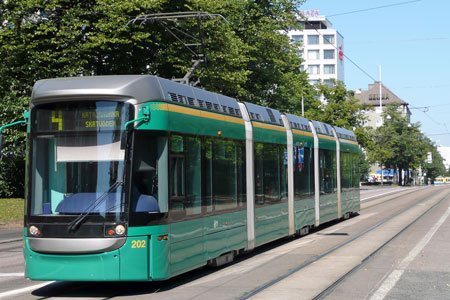
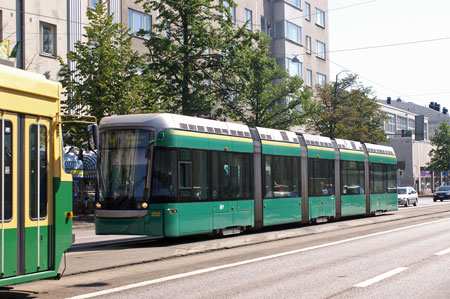
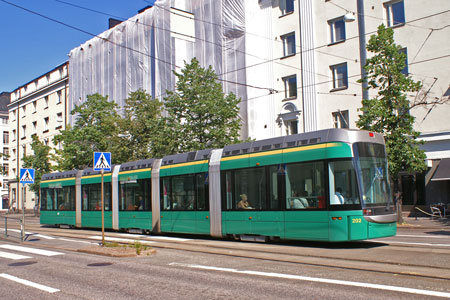
Tram 203
Variotram No.203 on route 3B
Photo: © Ian Boyle, 9th August 2007
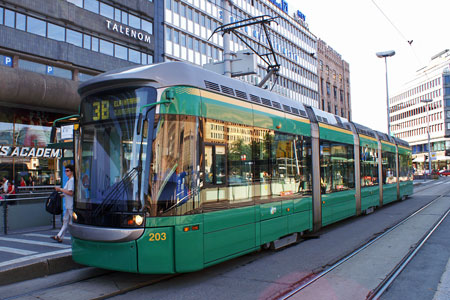
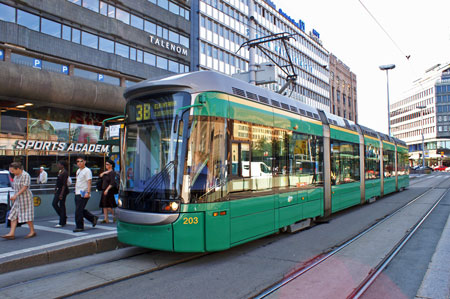
Tram 205
Variotram No.205 on route 10
Photo: © Ian Boyle, 9th August 2007
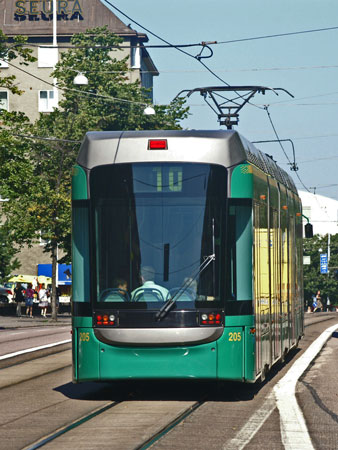
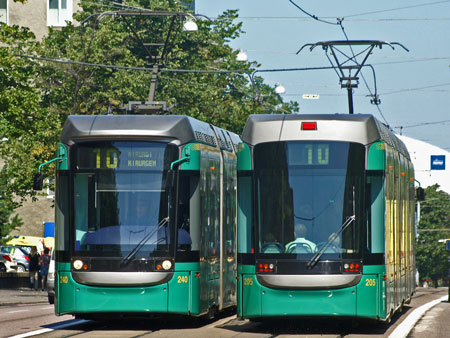
Tram 206
Variotram No.206 on route 3T
Photo: © Ian Boyle, 9th August 2007
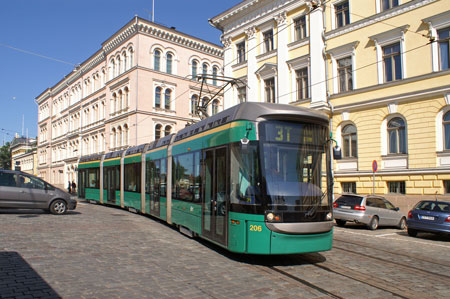
Tram 215
Variotram No.215 on route 10
Photo: © Ian Boyle, 9th August 2007
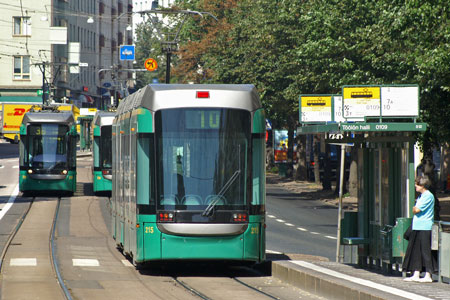
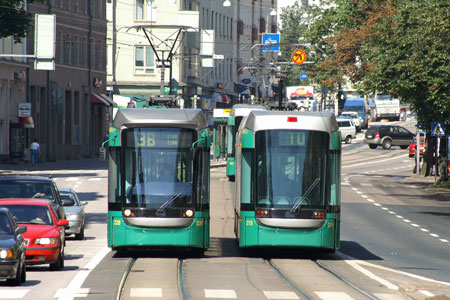
Tram 220
Variotram No.220 on route 4
Photo: © Ian Boyle, 9th August 2007
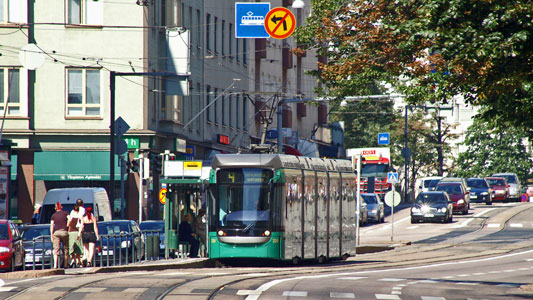
Tram 221
Variotram No.221 on route 10
Photo: © Ian Boyle, 9th August 2007
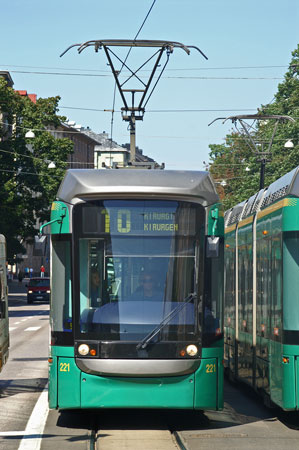
Tram 226
Variotram No.226 on route 10
Photo: © Ian Boyle, 9th August 2007
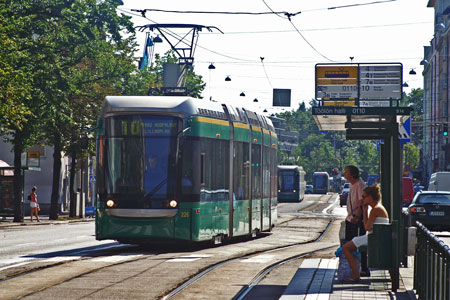
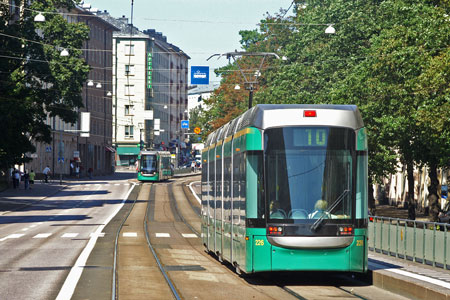
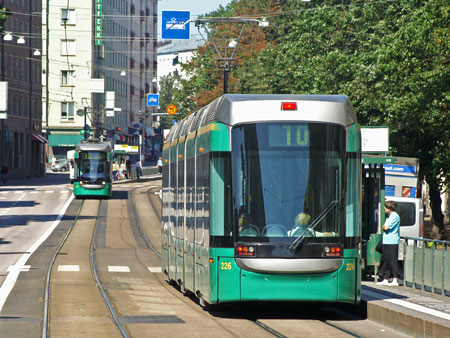
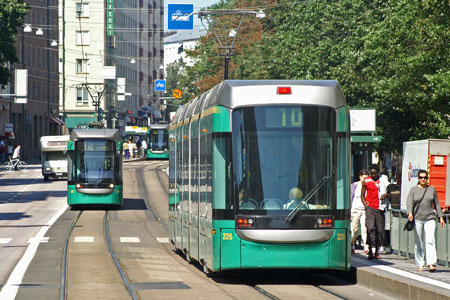
Tram 228
Variotram No.228 on route 3B
Photo: © Ian Boyle, 9th August 2007
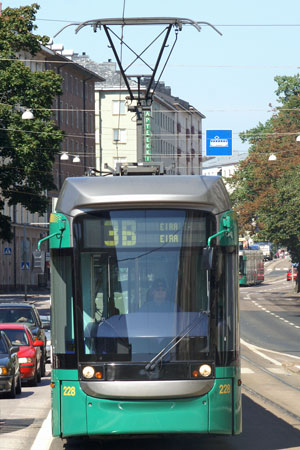

Tram 229
Variotram No.229on route 10
Photo: © Ian Boyle, 9th August 2007
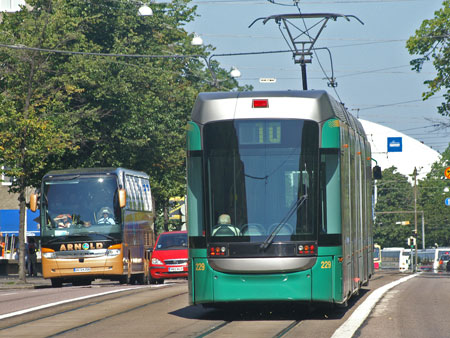
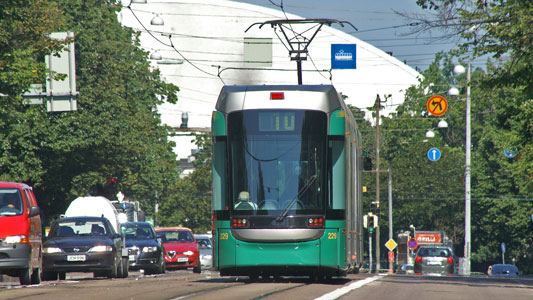
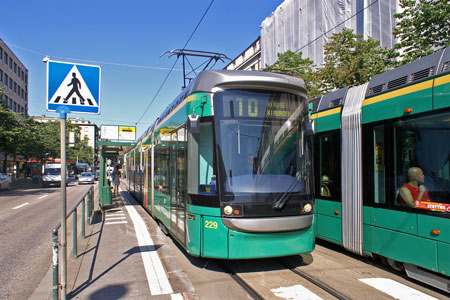
Tram 239
Variotram No.239 on route 10
Photo: © Ian Boyle, 9th August 2007
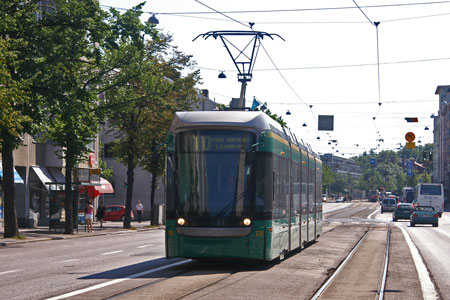
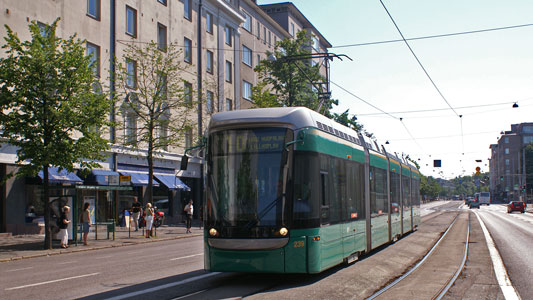
Tram 240
Variotram No.240 on route 10
Photo: © Ian Boyle, 9th August 2007
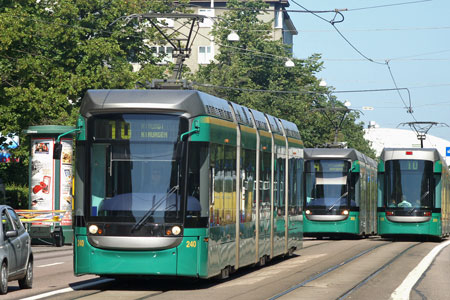

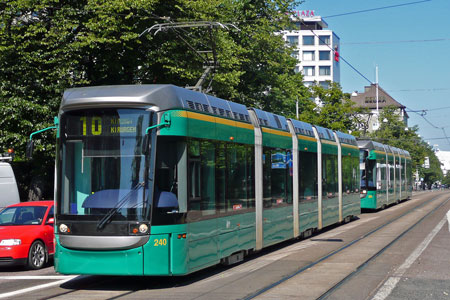
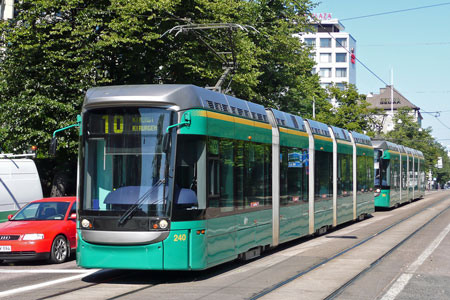
HKL took delivery of two rail grinders (originally
numbered 1 and 2, later changed into 2118 and 2119) from Schörling in 1953
and 1955, respectively. 2118 was converted into rail scrubber in 1993 in
Gothenburg. It was scrapped in 2011. 2119 remains at the time of writing,
although it too is likely to be scrapped as HKL took delivery of a new
multi-purpose work car HKL 2010 in 2010, with a second unit to follow. (ref: Wikipedia/Kalle Id)
Railgrinder 2118
Railgrinder 2118
Photo: © Kalle Id: 29th August 2010
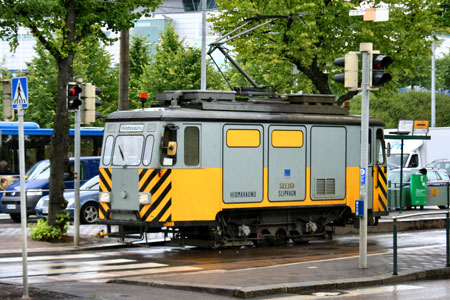
Suomenlinnan Liikenne Oy (SLL) is a public utility
company jointly owned by the State of Finland and the City of Helsinki,
which operates transport to the island of Suomenlinna. The City’s shares in
SLL are held by HKL. SLL runs passenger traffic between Kauppatori and the
main pier at Suomenlinna. Transport is mainly provided by two vessels, the
Suomenlinna II owned by the company itself and one subcontracted
vessel, the Tor. The company also runs maintenance traffic from
Katajanokka on the maintenance ferry Ehrensvärd. Helsinki internal
tickets and regional tickets are valid on Suomenlinna ferries, as is the
Suomenlinna ticket.
Suomenlinna-Sveaborg
(SLL: 1952-2004)
Suokki
(Sun Lines: 2004- )
Suokki was built in 1952 at Valmet's
Suomenlinna shipyard as Suomenlinna-Sveaborg for SLL. Until the
delivery of this ship, the island had been served by steamers belonging to
the Finnish Navy. In 2004, when the new
Suomenlinna II was completed, the Suomenlinna-Sveaborg was
sold to Sun Lines and renamed Suokki (a nickname for Suomenlinna).
She continues to be used on the service to Suomenlinna as a reserve ferry
and a third ferry during the summer high season, alongside the
Suomenlinna II and Tor. (ref: Kalle Id)
SLL ferry
Suomenlinna-Sveaborg on the
route from Kauppatori and the main pier at Suomenlinna
Photo: ©1998 Ian Boyle
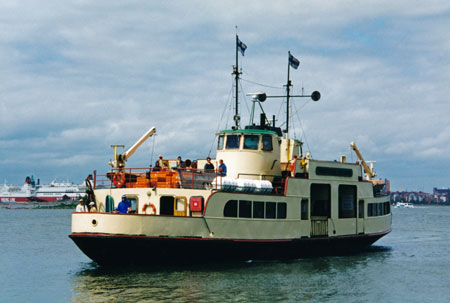
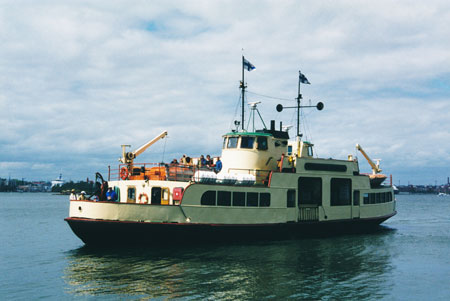
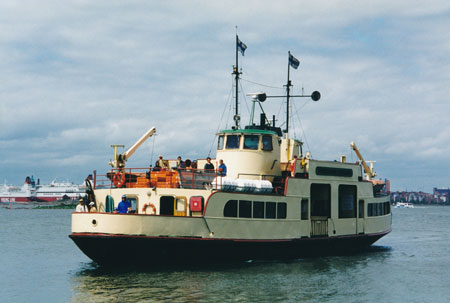
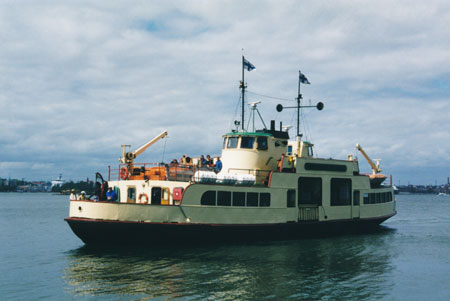
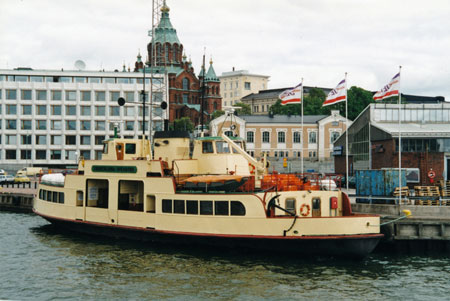
SLL ferry Suokki on the
route from Kauppatori and the main pier at Suomenlinna
Photo: © Ian Boyle, 9th August 2007
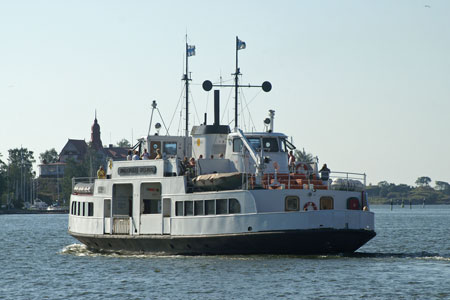
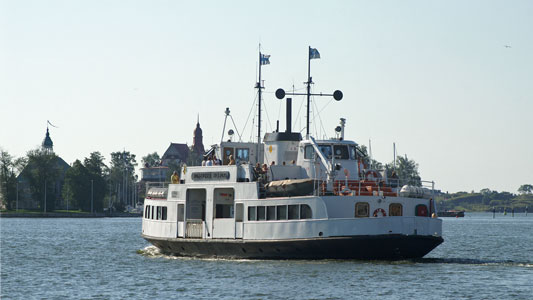
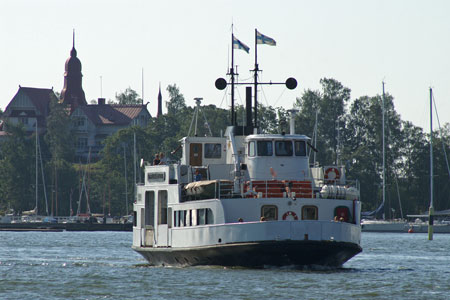
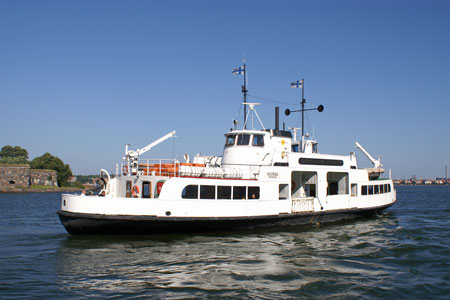
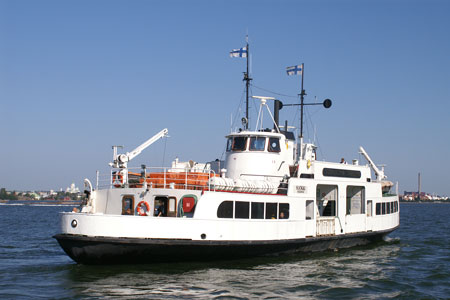
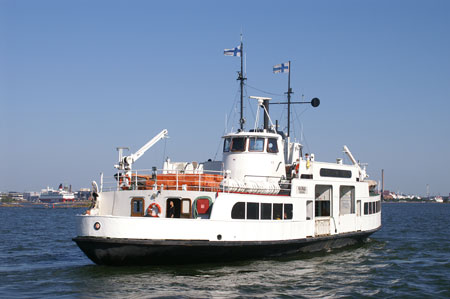
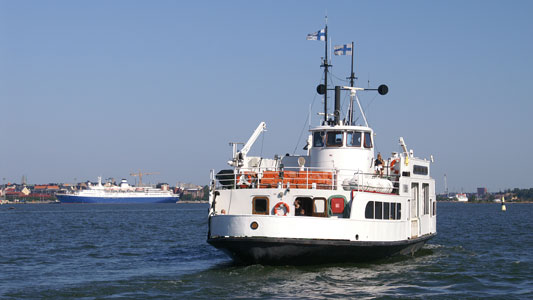
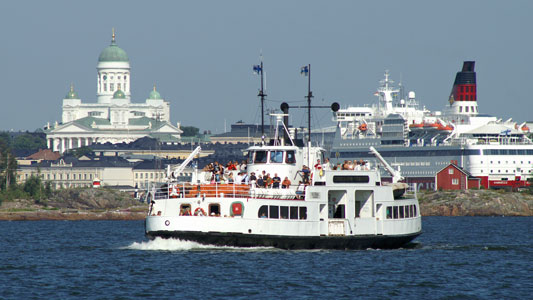
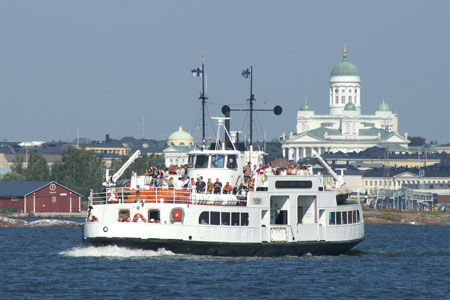
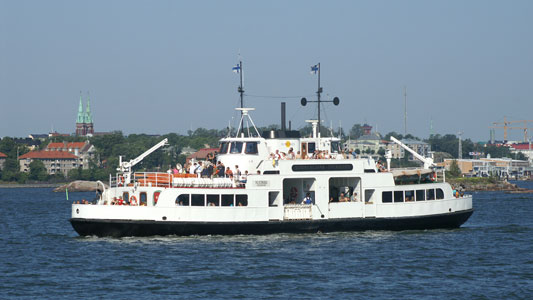
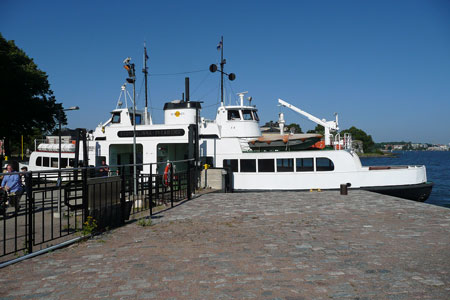
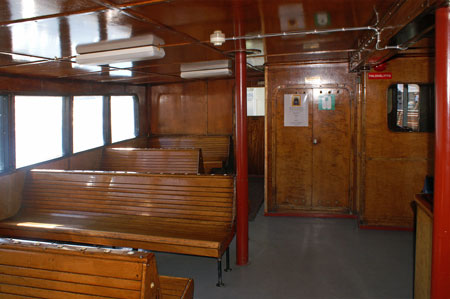
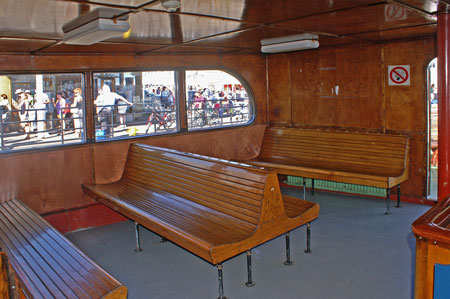
Ehrensvärd was built in 1978 at Hollming,
Rauma for SLL. Ehrensvärd runs maintenance traffic from Katajanokka on the maintenance ferry.
(ref: Kalle Id)
SLL ferry Ehrensvärd on
the maintenance route to Suomenlinna
Photo: © Kalle Id: 29th August 2010
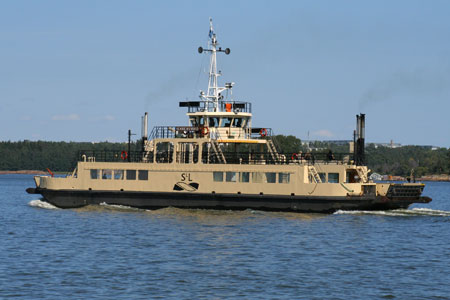
SLL ferry Ehrensvärd on
the maintenance route to Suomenlinna
Photo: © Ian Boyle, 9th August 2007
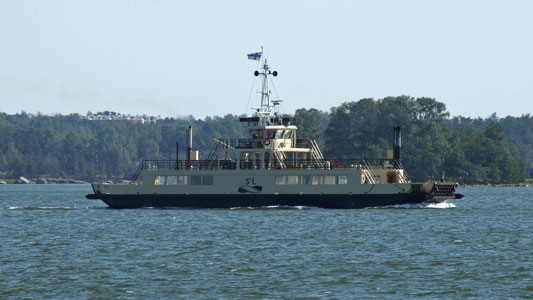
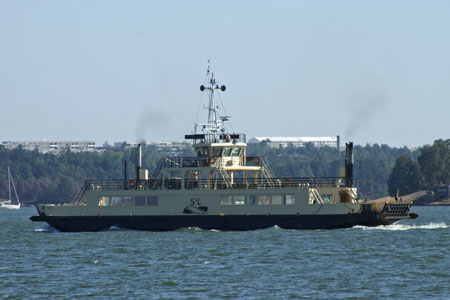
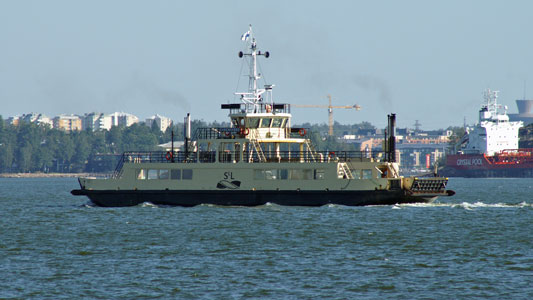
Tor
(Built: 1952 - Sun Lines: 1992- )
Tor was built in 1952 at Hammarbyverket in Stockholm as a harbour
tug under the name TOR. She served as a tug in Gävle (Sweden), Ykspihlaja
(Finland) and Loviisa (Finland) until 1992 when she was sold to Sun Lines
and converted into a ferry (retaining the original name), serving alongside
the Suomenlinna-Sveaborg and later
Suomenlinna II on the Kauppatori-Suomenlinna run.
(ref: Kalle Id)
SLL ferry Tor on the
route from Kauppatori and the main pier at Suomenlinna
Photo: ©1998 Ian Boyle
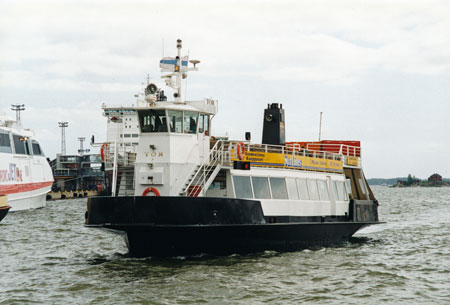
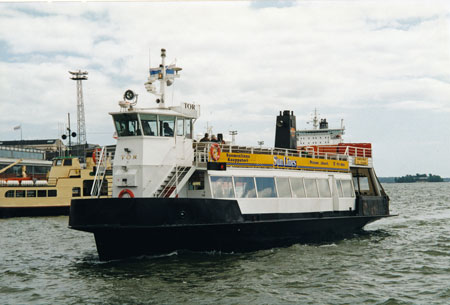
SLL ferry Tor on the
route from Kauppatori and the main pier at Suomenlinna
Photo: © Kalle Id, 17th May 2009
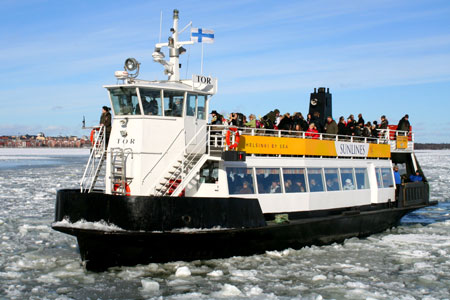
SLL ferry Tor on the
route from Kauppatori and the main pier at Suomenlinna
Photo: © Kalle Id, 25th February 2009
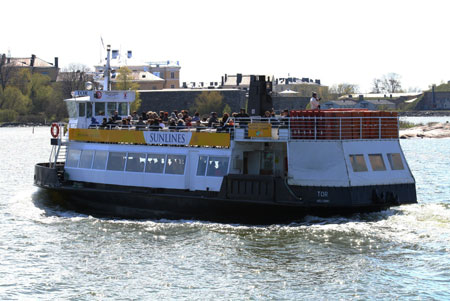
Suomenlinna II
(SLL: 2004- )
Suomenlinna II was built in 2004 at Stocznia Marynarki Wojennej for
SLL. Officially she was to become a replacement for Suomenlinna-Sveaborg,
but as we have seen this was not the case. The
Suomenlinna II suffered from a series of technical problems after
delivery, but these were eventually fixed. (ref: Kalle Id)
SLL ferry Suomenlinna II on the
route from Kauppatori and the main pier at Suomenlinna
Photo: © Ian Boyle, 9th August 2007
